2023년 6월 2일 문화 발달과 전수에 대한 특별 회의에서, 시진핑은 마르크스와 공자 (유가사상)의 "제 2차 결합"의 중요성을 주창했다.
TV 시리즈 "마르크스가 공자를 만났을 때" 요지.
1. 마르크스가 공자와 자신과의 차이점을 말하다
마르크스가 공자의 사상을 이렇게 평가했다. "당신은 부족과 가족의 가부장적 체제를 사회의 기초라고 간주했다. 당신의 철학은 체제의 안정을 위해 헌신했고, 그 반면 나는 인류 해방을 추구했다. 따라서 나는 현존 국가의 옹호론자가 아니다. 오히려 난 소유계급의 무덤을 파길 희망했다 "
2. 공자가 차이점을 인정하며, 유사점을 말하다.
공자가 이러한 마르크스의 주장에 대해 답변하길, "우리들 사이에 차이점이 있다. 그러나 비슷한 점들도 있다. 우리 둘다 인류의 최대 행복을 추구했다"
3. 마르크스의 이상 사회.
마르크스는 자신의 이상 사회를 이렇게 설명했다. 그의 능력에 따라 분배하는 사회가 1단계 이상사회이고, 그의 필요에 따라 분배하는 사회는 2단계 이상사회로 나는 이를 communism 이라고 부른다.
4. 공자의 이상 사회.
공자가 말했다. 사회의 부는 '나' 만의 소유로 저장해서는 안되고, 전 사회에 분배되고 향유되어야 한다. 이런 사회를 가리켜 '대동 사회'라고 부른다.
5. 공자와 마르크스 공통점. 인민, 민본주의 사상.
인민이 사회적 기초이다.
6. 중국의 기술 발달. 고속철도의 발전 선전.
공자 말했다. "내가 위 ( 魏 ), 조( 曹 ), 송 宋 , 제 齊(齐), 정 鄭(郑), 진 晉 (晋), 진 陳(陈), 채 ( 蔡 )나라 등 수 많은 나라들을 방문하는데, 14년이 걸렸다. "
중국 한 학생이 설명한다. "공자님이 노 (魯) 나라를 출발해 위나라를 거쳐 조나라에 도착했는데, 이제 루난 (노남) 고속 철도를 이용하시면, 58분 밖에 걸리지 않습니다"

마르크스는 중국 전통복을 입고, 공자는 양복을 입었다.

------------- 이코노미스트 소개. 2023.nov.4th. pp.33-34.
사실. 중국 후난성이 한 tv 시리즈, 마르크스와 공자의 대화 시리즈를 제작했음.
제목은 "마르크스가 공자를 만났을 때, When Marx met Confucius" 5부작이다.
시청자 반응은 별로 신통치 않음.
중국 현대 정치사에서, 마르크스를 '중국화'하자.
1) 중국 공산당 마르크스를 '중국의 특별한 상황 (특수성)'에 맞게 변용하자.
이러한 이데올로기적 유연성 때문에, 등소평 (등샤오핑)의 개혁 개방 - 자본주의 시장 경제 도입.
2) 시진핑 노선. 마르크스와 중국 전통문화와 혼합하자.
1966년~1976년 중국 문화혁명과 비교.
당시 공자 타도운동을 함. 유가 서적들을 불태우고, 공자 묘까지 모욕을 함. 문혁 당시 청년들은 유가의 '효' 개념을 비난했음. 그러나 1976년 마오쩌둥 사후, 중국 공산당은 유가 사상을 존중하기 시작했고, 유가를 '권위'에 대한 존중을 가르친다는단순한 해석에 관심을 보여줬다.
등사오핑은 공자 탄생일을 기념할 수 있도록 해줬음.
장쩌민과 후진타오는 유가 사상의 가치를 높이 평가했다.
급기야 2000년대 초반에는 중국 학자들이 유가 사상이 중국의 '통치 이념'으로 될 수 있을가를 놓고 토론을 펼치기도 했다.
시진핑이 이러한 '통치이념' 논쟁을 종결시켰는데, 그 결론은 다음과 같다.
'마르크스주의는 중국 문화의 정신이고, 유가 사상은 중국문화의 뿌리이다'
이 두 가지 중에 하나를 버리는 것이 아니라, 두 가지가 하나로 융합되어야 한다.
공자와 마르크스의 차이점에 대해서 두 사람이 대화하다.
마르크스가 말하길 "공자는 사회적 질서를 유지하는데 계급(위계질서)이 필수적이라고 주창했지만, 나는 노동자 혁명을 주창했다. 공자는 사회안정을 유지하려고 했지만, 나는 인류의 해방을 부르짖었소."
공자가 답하길 "그러나 우리 둘 모두 모든 인류의 최대 행복을 실현하고자 노력했지 않습니까?
"마르크스 당신은 계급소멸 사회를, 나는 대동 (大同) 사회를 추구했다는 게 공통점입니다" 라고 답변했다.
China | One leader, two philosophies
Xi Jinping is trying to fuse the ideologies of Marx and Confucius
A new television show places them at the centre of Chinese culture
Karl Marx meets Confucius

Nov 2nd 2023
Karl marx and Confucius may have lived 2,400 years apart, but on Chinese state television they stroll together through an ancient Chinese academy. In a sun-dappled bamboo grove, a group of student painters invite the two philosophers to be their models. As the young people paint, Marx and Confucius chat. They are impressed with China’s high-speed trains, among other things. When the portraits are revealed, the thinkers are surprised. Marx is depicted in a Tang-dynasty robe; Confucius is portrayed in a Western suit and tie. But both are delighted. “I’ve been in China for more than a hundred years,” says Marx (in Mandarin). “Actually, I have been Chinese for a long time.” Confucius chuckles, stroking his beard. Long hair looks a bit strange with the suit, he says, but it make sense to keep changing.
The scene is from “When Marx Met Confucius”, a television series created by the propaganda department in Hunan province and released in October. It is not popular. On Douban, a film website, it has received only 100 or so reviews, most of them negative (eg, “makes me sick”). But for those who can stomach it, the show is a good way to understand Xi Jinping Thought on Culture, the latest branch of the Chinese leader’s philosophy.
Other parts of Mr Xi’s thinking emphasise tighter Communist Party control over such things as diplomacy, defence and the economy. Xi Jinping Thought on Culture, announced in October, attempts to fuse pride in Chinese tradition with loyalty to the party. Its most important tenet is the “two combines”, party-speak for a decades-long process to make Marxism more Chinese. The first combine refers to early efforts to adapt Marxism to China’s “specific reality”. Such ideological flexibility allowed Deng Xiaoping, China’s former leader, to pursue economic reforms in the 1980s. The second combine is Mr Xi’s idea: to sinicise Marxism by melding it with traditional Chinese culture.
The effort represents the culmination of a radical turnaround for the party, which once considered tradition its enemy. During the Cultural Revolution of 1966-76, Mao Zedong’s Red Guards destroyed Confucian temples, burnt Confucian texts and desecrated the sage’s tomb. Young people denounced their elders, contradicting Confucianism’s emphasis on filial piety. But after Mao’s death in 1976 the party warmed to Confucius, or at least to a simplified version of his teachings that emphasises deference to authority. Deng allowed public celebrations of the philosopher’s birthday. Jiang Zemin and Hu Jintao, Deng’s successors, appropriated Confucian ideas. In the early 2000s Chinese scholars debated whether Confucianism might even replace Marxism as China’s guiding ideology.
Mr Xi is putting an end to that debate. Marxism is the “soul” and Confucianism the “root” of Chinese culture, he says. Neither ideology can be abandoned. Instead, they must be merged.
“When Marx Met Confucius” guides viewers through this new thinking. For much of the five episodes, the philosophers sit on a stage in front of students and a rotating cast of scholars and party officials. A young woman wearing hanfu, traditional robes, plucks a guzheng, or ancient zither, in the background. The philosophers converse with holograms of figures such as Vladimir Lenin and Mao, who explain how their thinking is compatible. The programme’s hosts then explain how it all fits into Xi Jinping Thought.
The show glosses over big differences between Confucius, who believed hierarchies were necessary to maintain social order, and Marx, who called for a proletarian revolution. “You were trying to maintain stability and I was seeking the liberation of all mankind,” says Marx. “But aren’t we both seeking the greatest good for all humans?” When Marx mentions his vision of a classless society, Confucius says he has a comparable concept called datong (great unity). “So we have many similarities!” says Confucius. The students applaud.
The Cultural Revolution is mentioned—once. It did “great damage”, says a host. But Mao doesn’t get the blame. At one point his spirit appears, assuring Marx and Confucius that he was a faithful communist and defender of traditional Chinese culture. Confucius nods approvingly.
The show spends more time bashing the West. A host blames foreign bullying of China in the 19th century for a “long-term cultural inferiority complex” (exacerbated by Chinese intellectuals, who at the time claimed China’s traditions made it weak). The early reform era of the 1980s is remembered as a dangerous period of “historical nihilism”, when Western ideas misled Chinese people into criticising their society and government. “Can a country become strong if its economy develops but its spirit is lost?” asks the host, quoting Mr Xi.
No is the implicit answer. A good thing, then, that Mr Xi is restoring China’s confidence, the show claims. Not only that, he and the party are pursuing the common good worldwide, in contrast to dastardly Western countries. America exports cluster bombs, while Japan dumps nuclear wastewater into the ocean, says a host. China, a “responsible great power”, would never do such things, he adds. Marx is impressed. He congratulates China for revitalising socialism and fulfilling his vision.
“When Marx Met Confucius” is easy to ridicule, but parts of its message are worrying. In the last episode, a student asks Confucius for advice on Taiwan, the self-governing island that China claims. “We truly have a traditional culture of peace, but some Western countries only believe in the law of the jungle,” says the student. “If they bully us or obstruct our national unification, should we still speak to them of peace?” Confucius furrows his brow. Goodness should be met with goodness, but hatred should be met with justice, he says. A host jumps in. China seeks peace, but if its dignity and interests are hurt, it will use military force to pursue national unification, he says. Images of fighter jets and warships fill the screen. ■






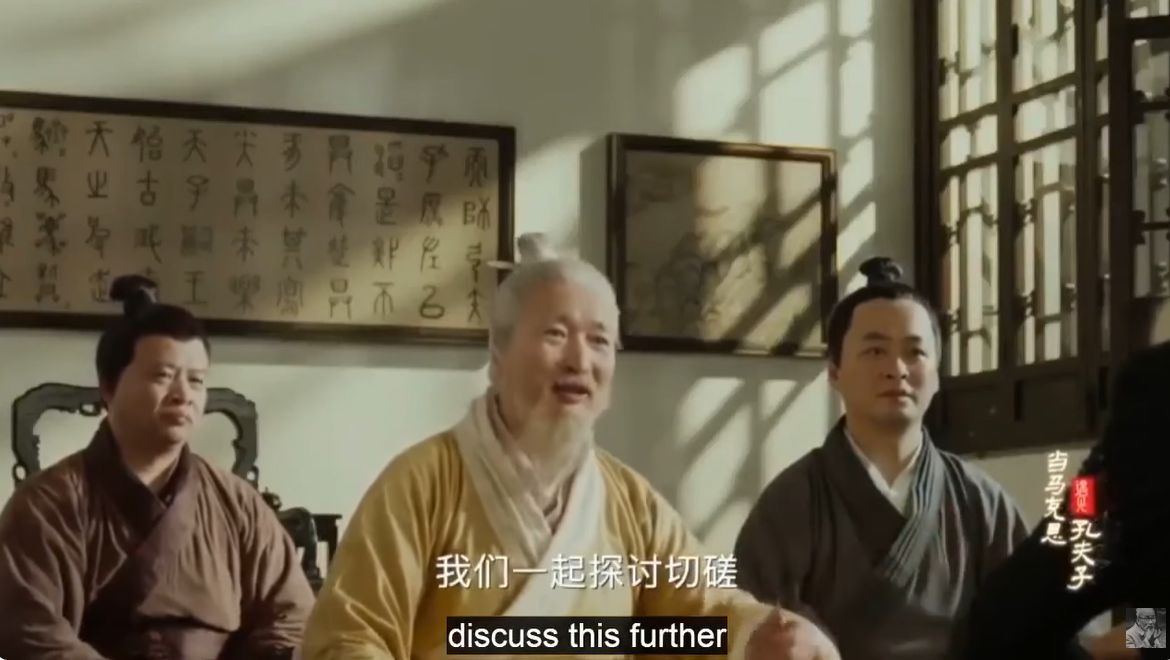
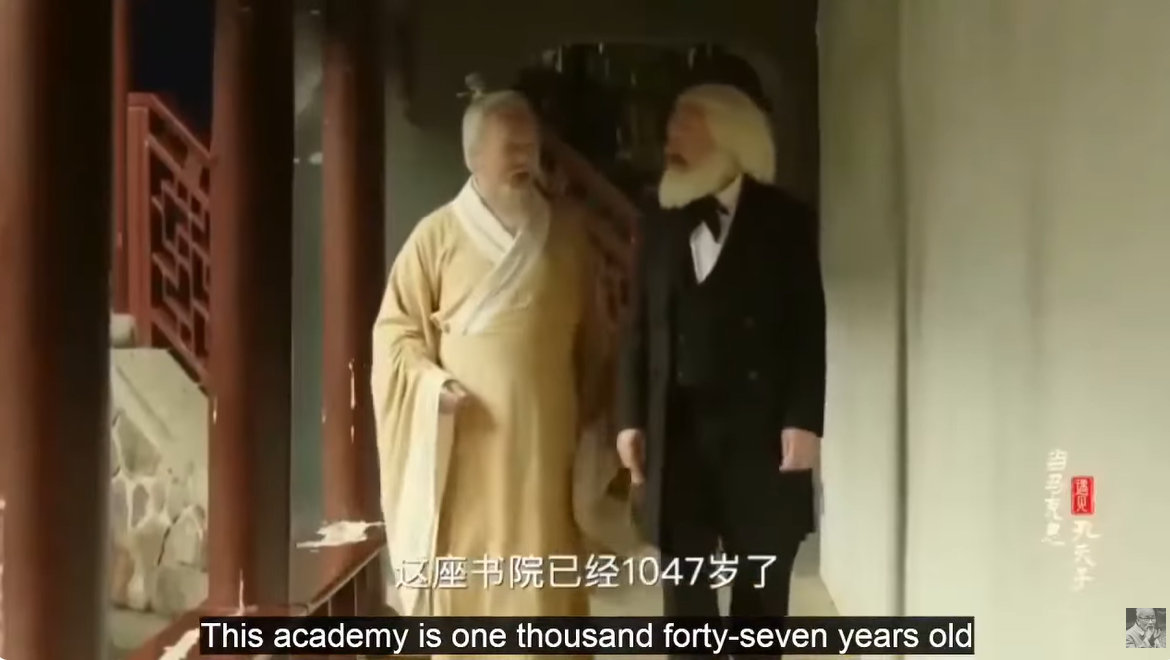
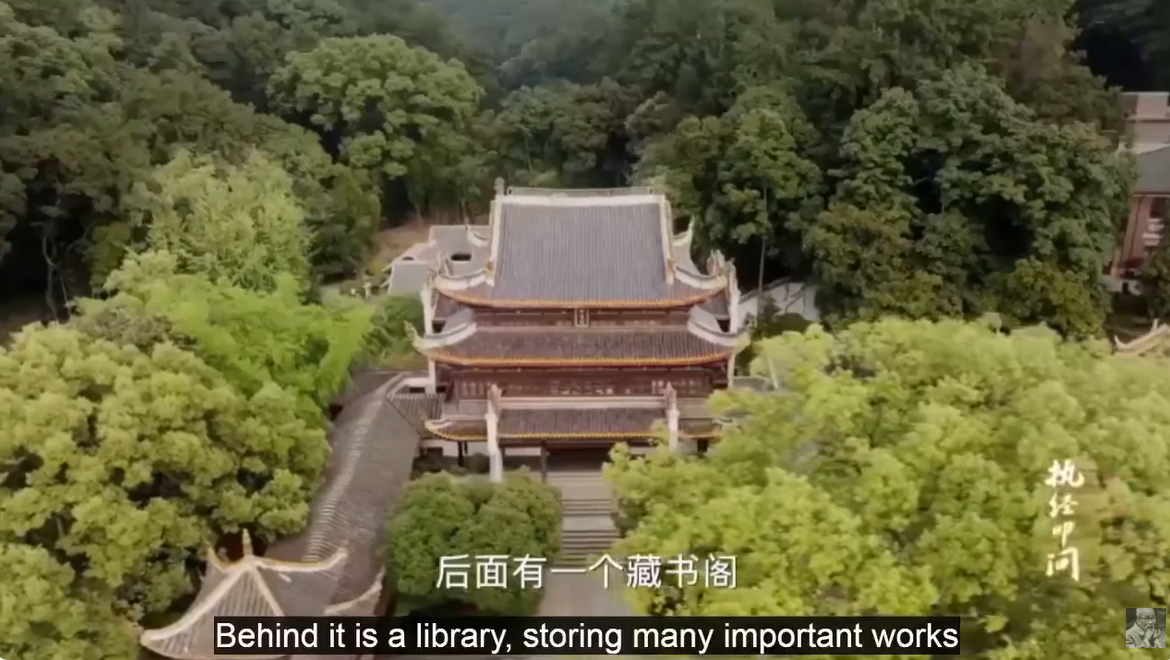

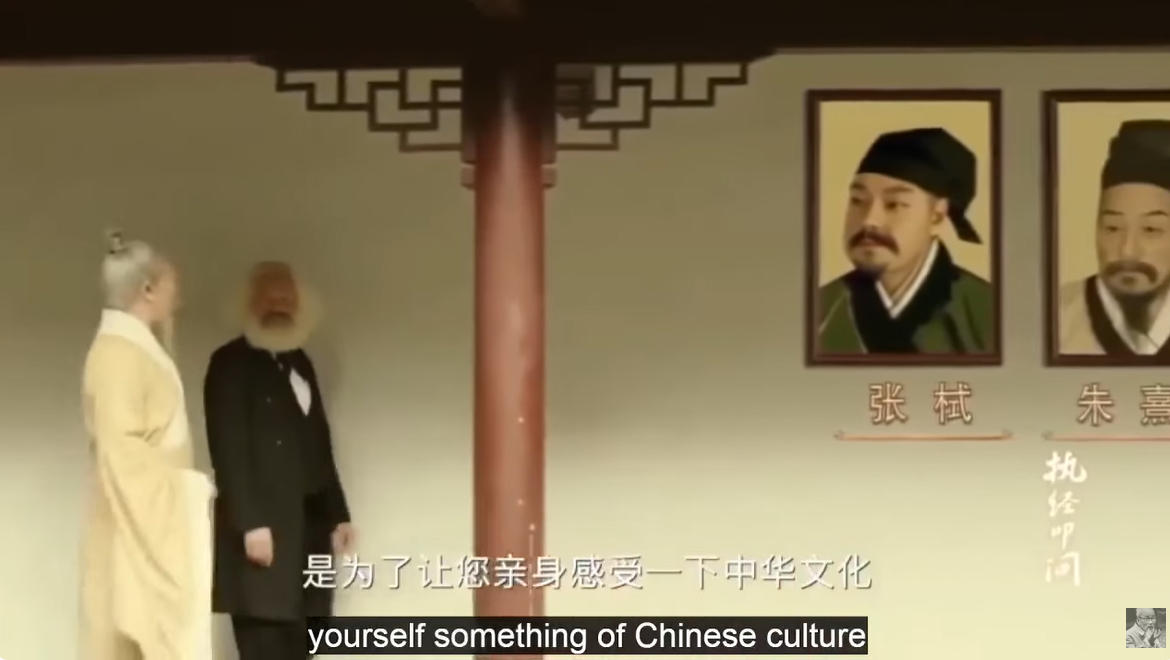

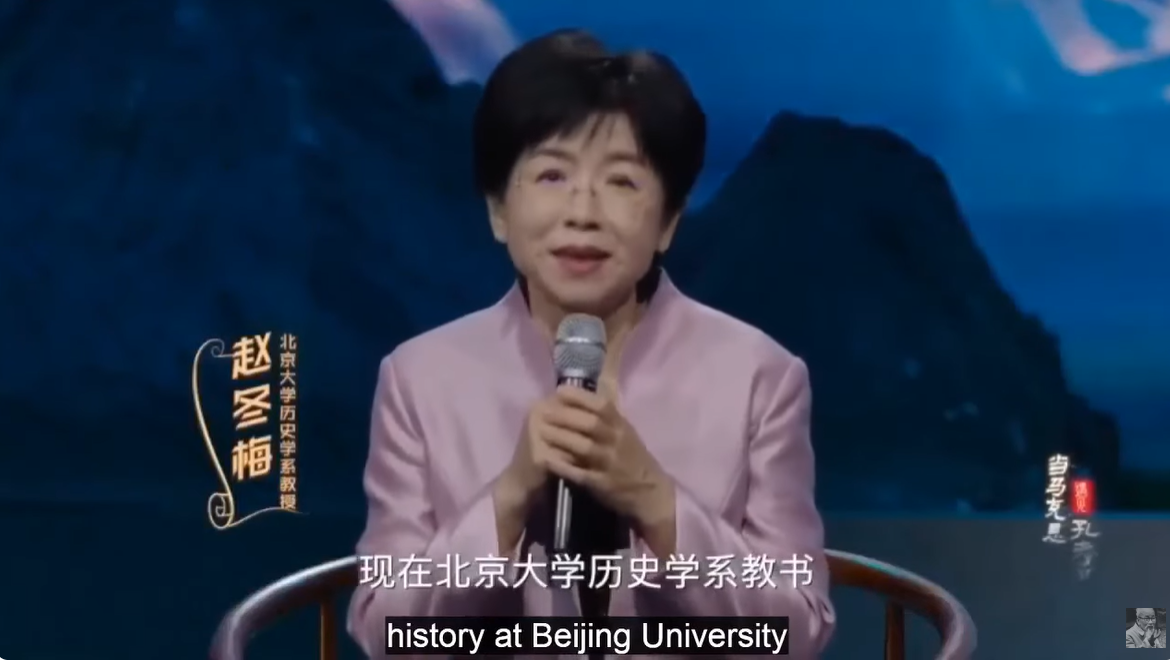
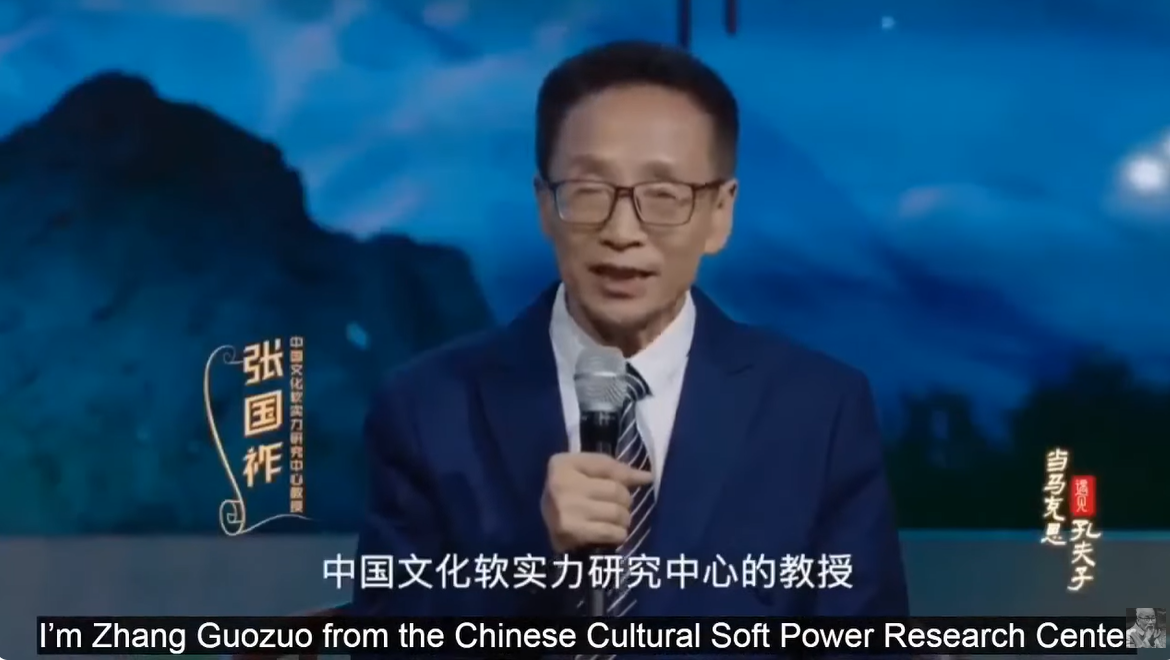






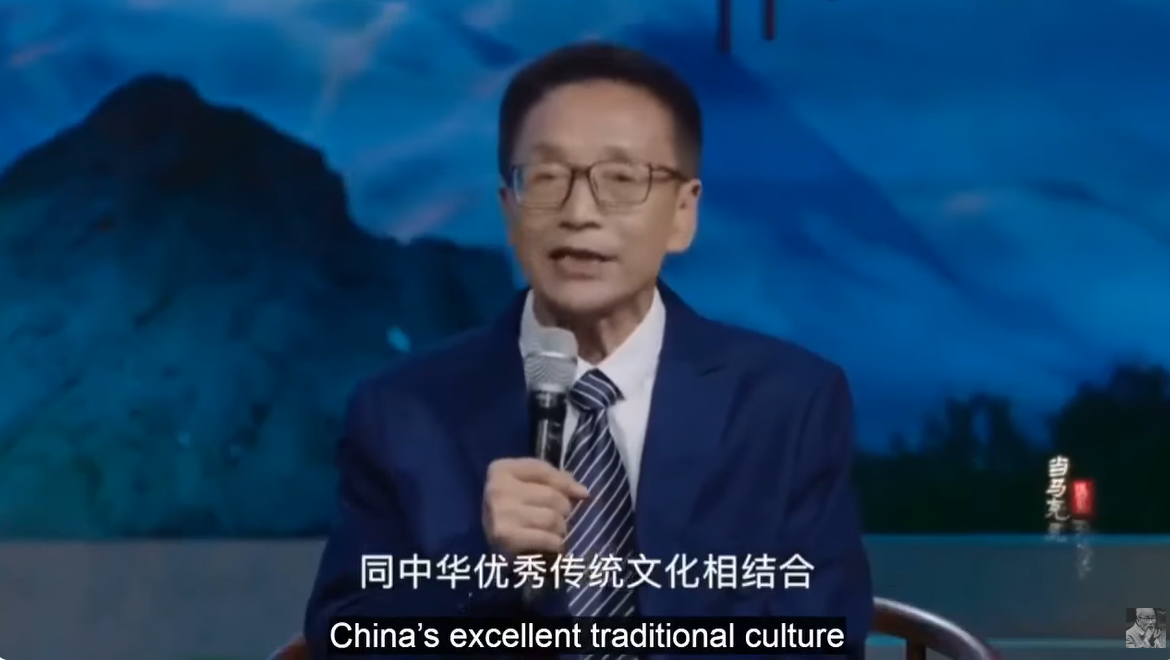
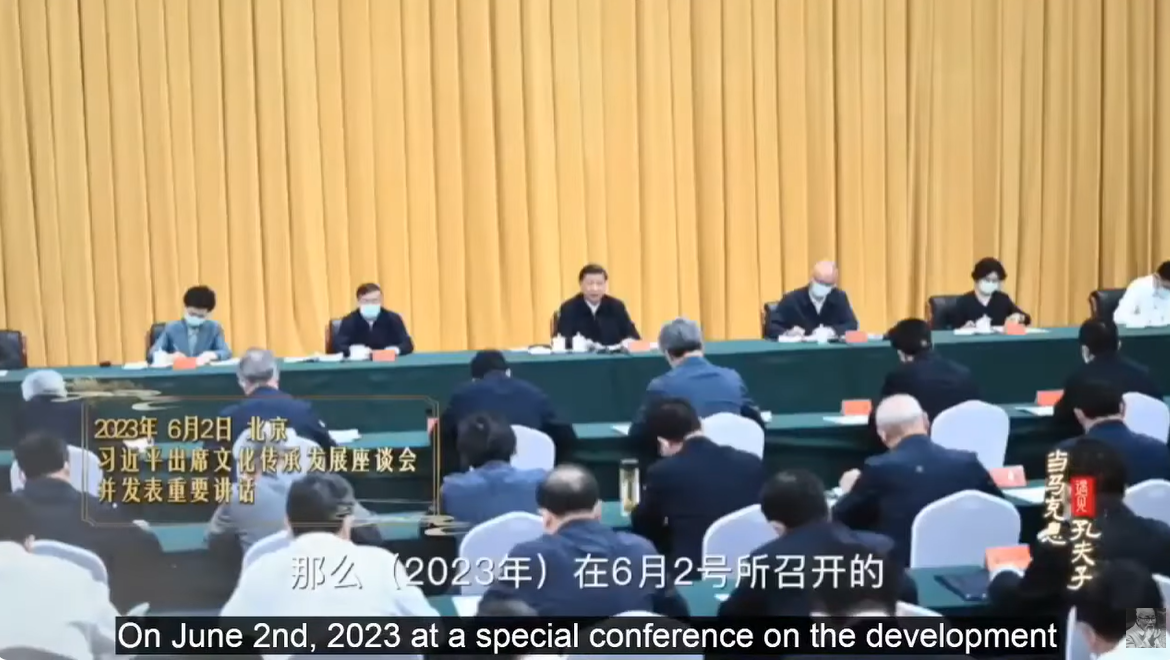
2023년 6월 2일 문화 발달과 전수에 대한 특별 회의에서, 시진핑은 마르크스와 공자 (유가사상)의 "제 2차 결합"의 중요성을 주창했다.




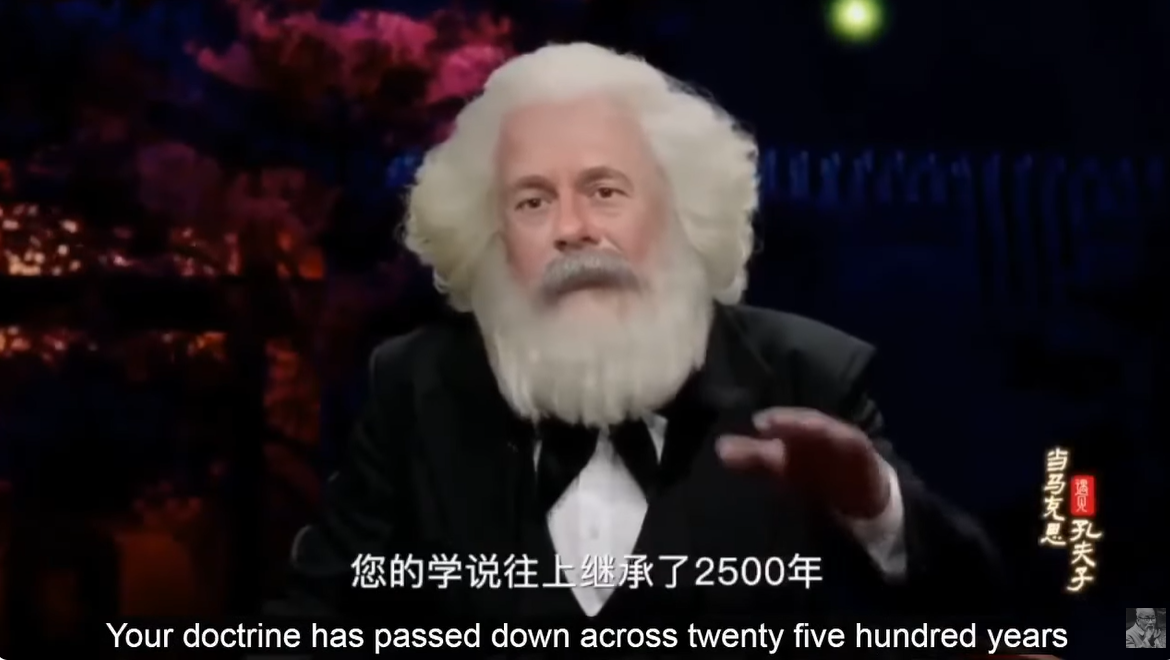

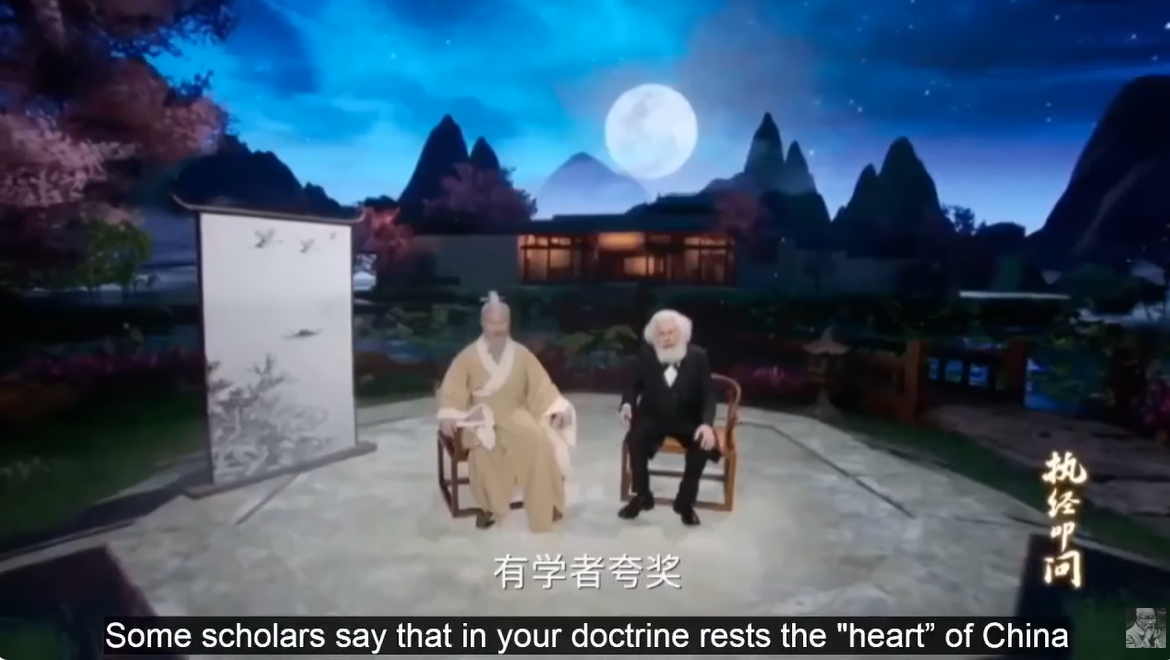
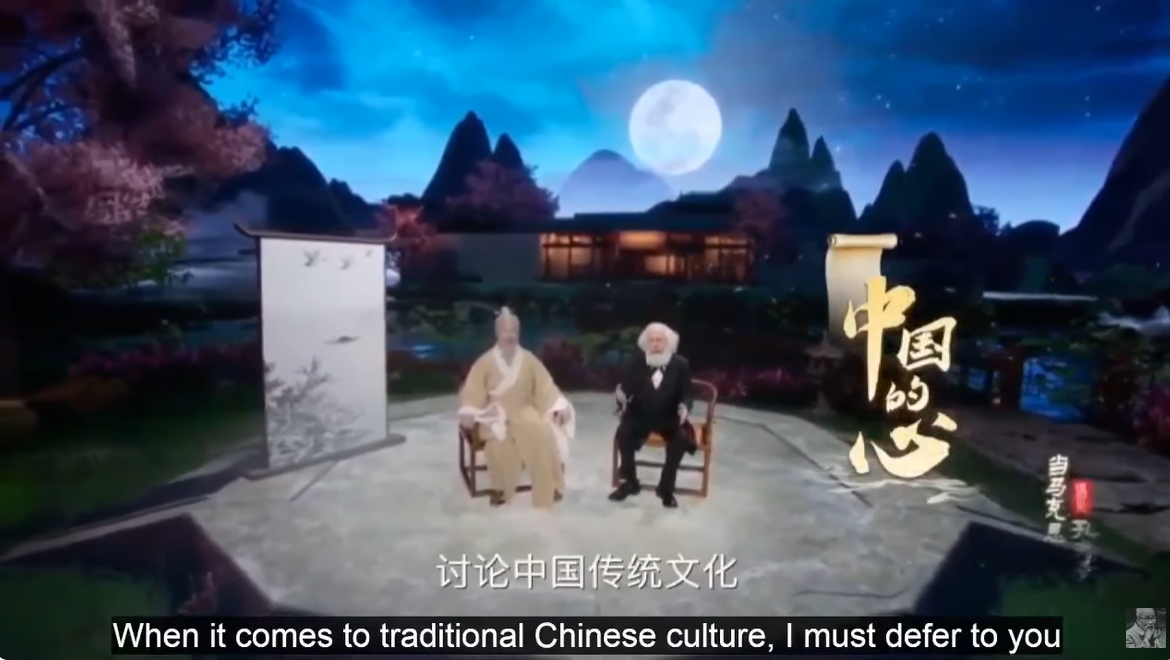
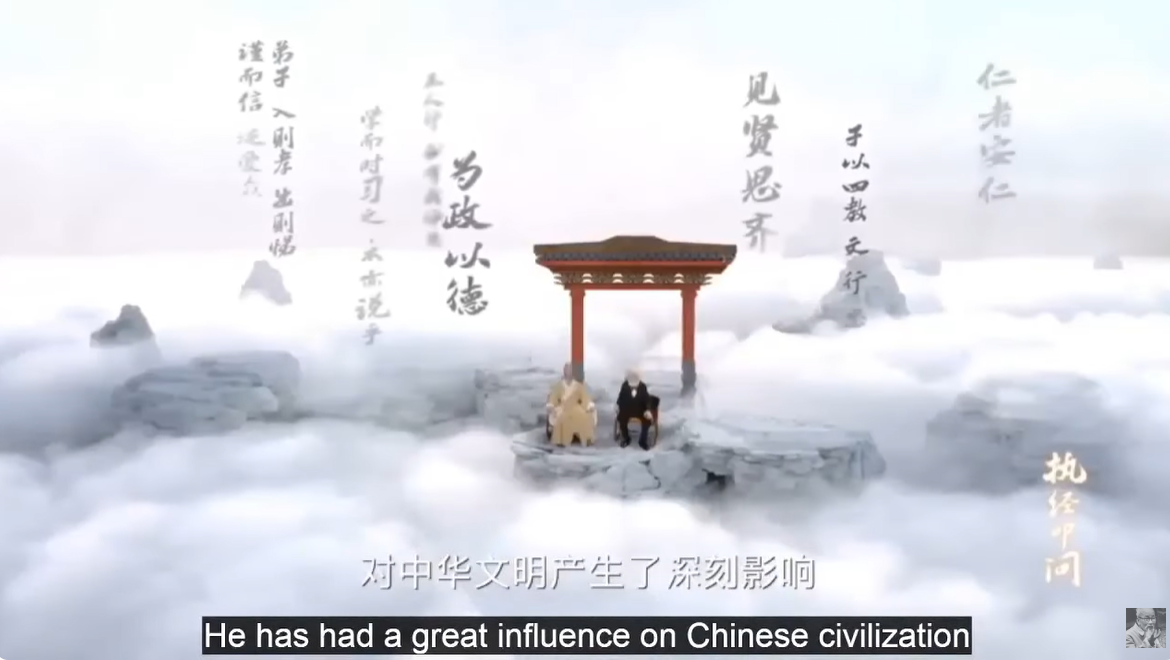

공자, 예와 인을 강조.
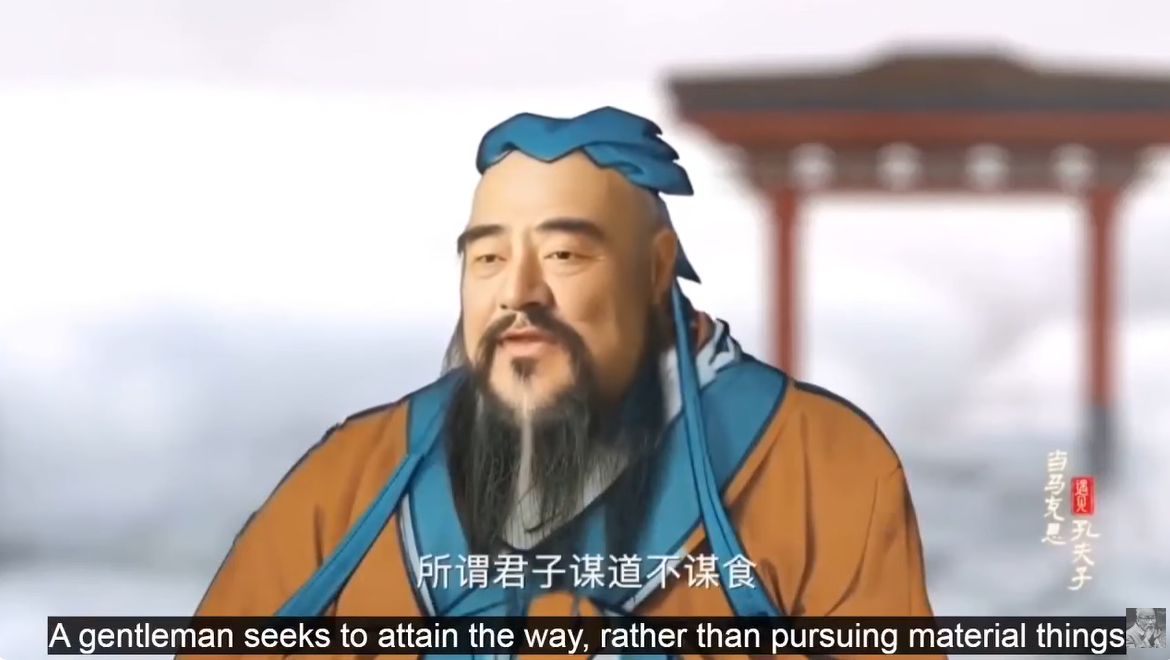
군자는 '도'를 추구해야지, '먹을 것'을 추구하지 않는다.






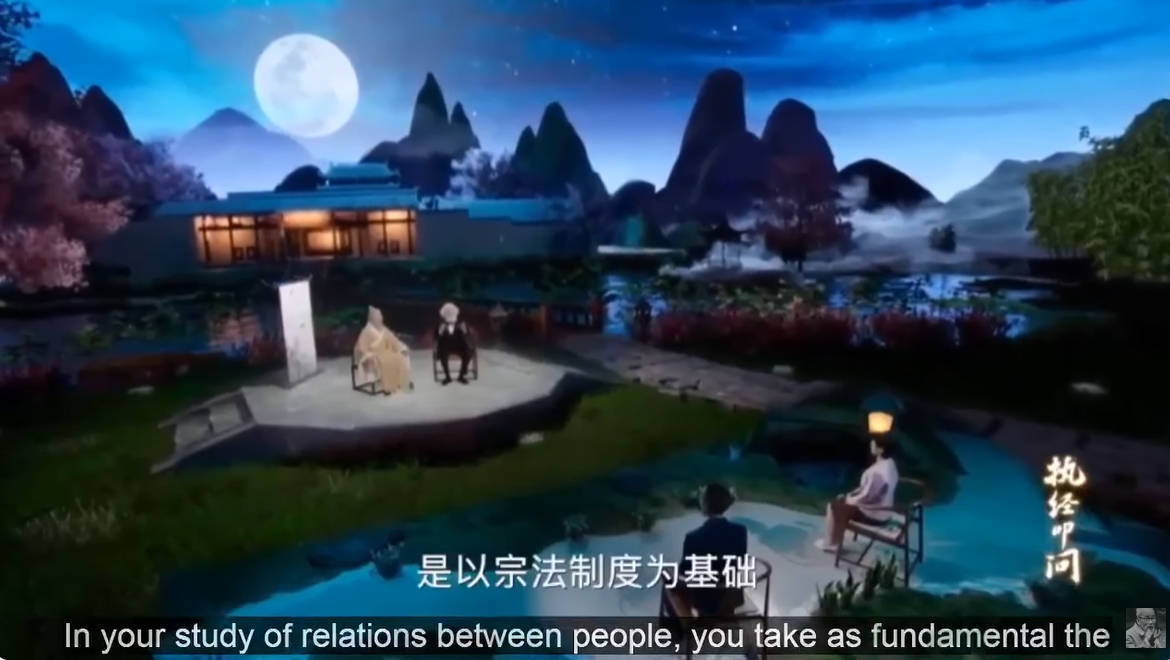

마르크스가 공자의 사상을 이렇게 평가했다. "당신은 부족과 가족의 가부장적 체제를 사회의 기초라고 간주했다. 당신의 철학은 체제의 안정을 위해 헌신했고, 그 반면 나는 인류 해방을 추구했다. 따라서 나는 현존 국가의 옹호론자가 아니다. 오히려 난 소유계급의 무덤을 파길 희망했다 "

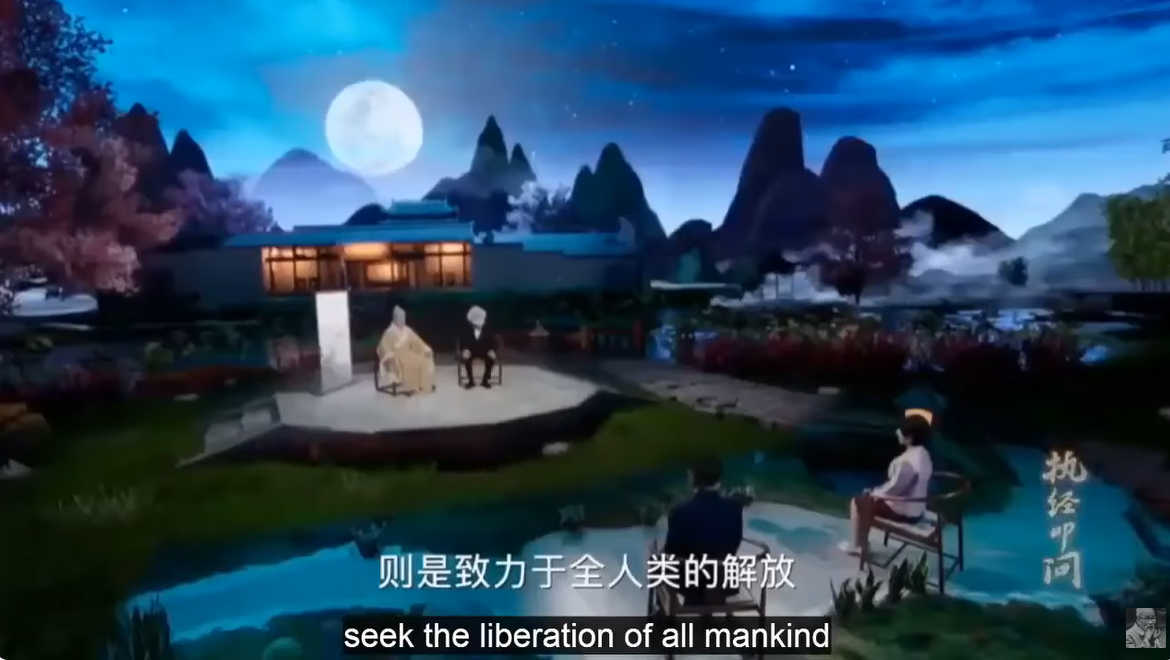



공자가 이러한 마르크스의 주장에 대해 답변하길, "우리들 사이에 차이점이 있다. 그러나 비슷한 점들도 있다. 우리 둘다 인류의 최대 행복을 추구했다"
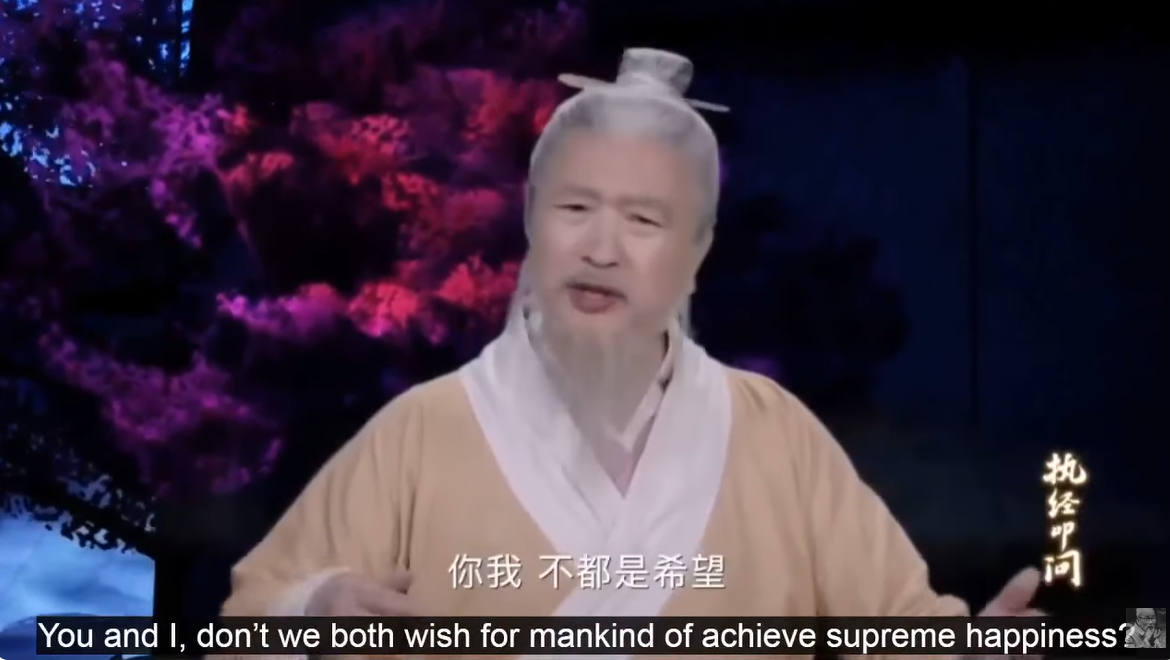
우리 둘다 인류의 최상의 행복을 추구했다.

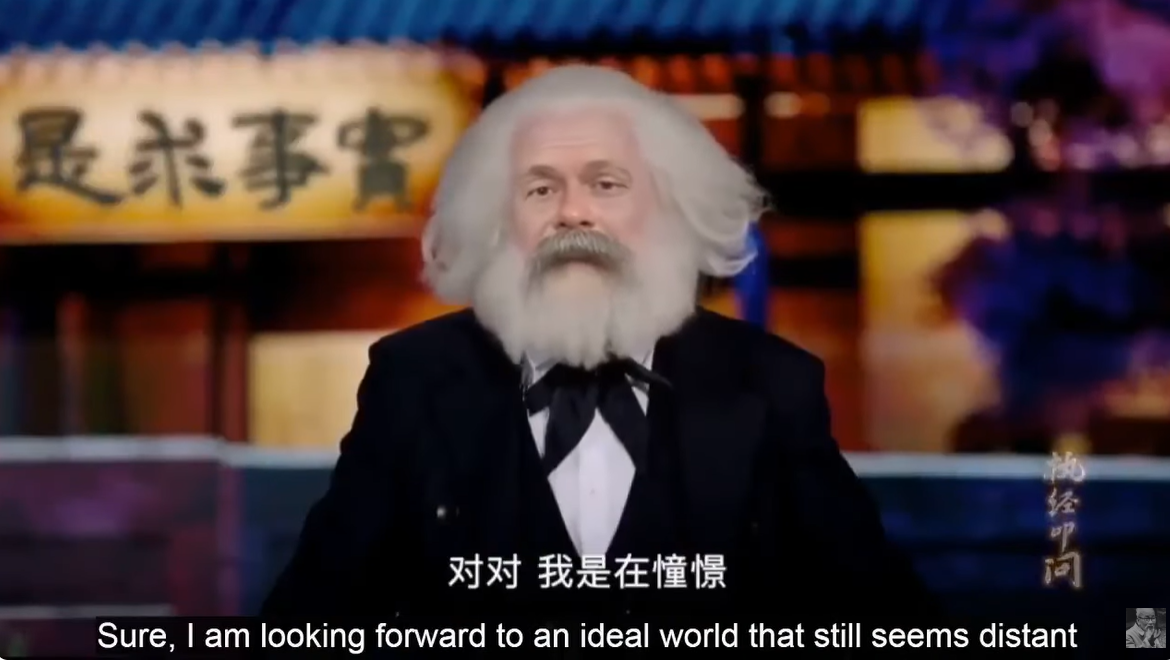
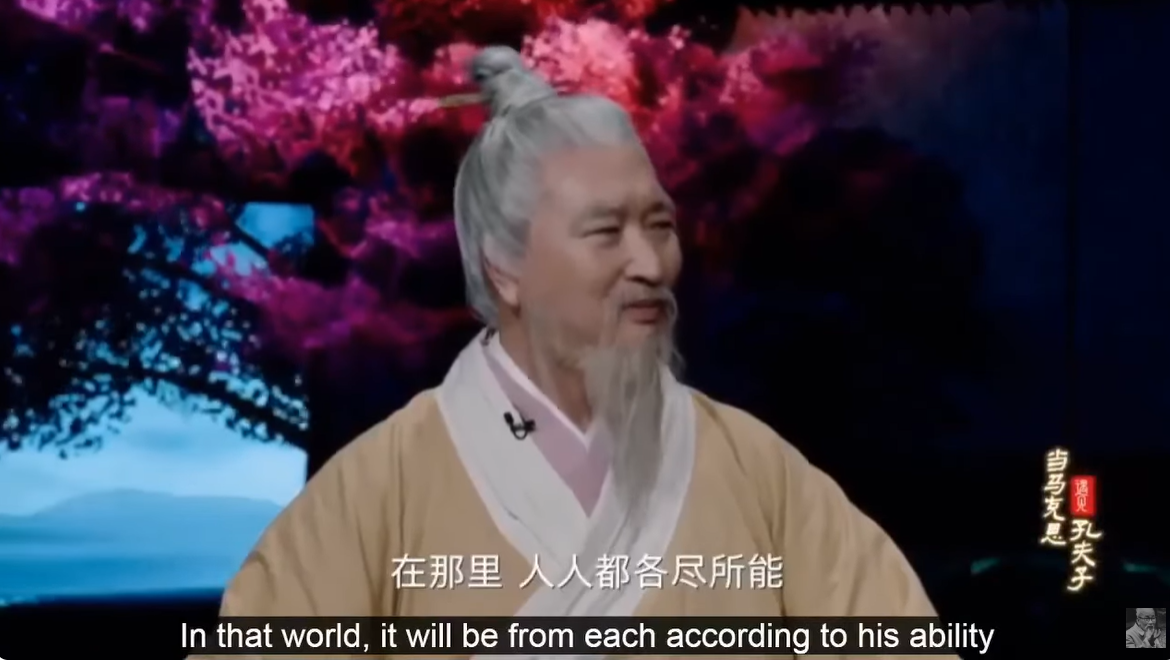
마르크스는 자신의 이상 사회를 이렇게 설명했다. 그의 능력에 따라 분배하는 사회가 1단계 이상사회이고, 그의 필요에 따라 분배하는 사회는 2단계 이상사회로 나는 이를 communism 이라고 부른다.

마르크스가 자신의 주장을 설명. communism 정의

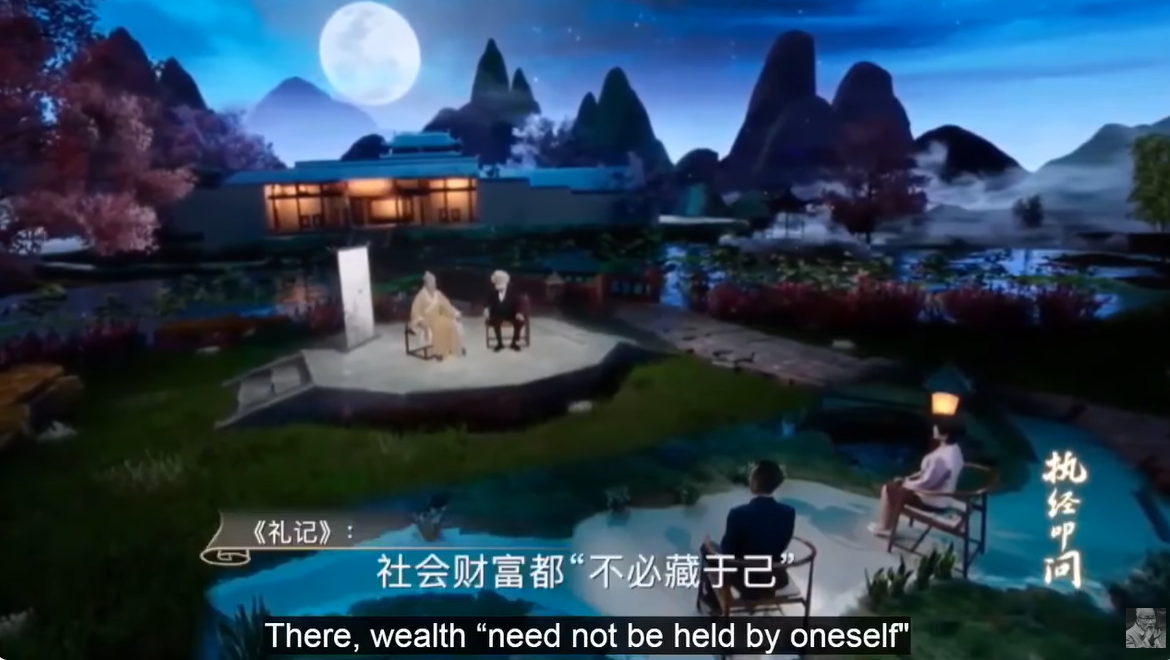
공자가 말했다. 사회의 부는 '나' 만의 소유로 저장해서는 안되고, 전 사회에 분배되고 향유되어야 한다. 이런 사회를 가리켜 '대동 사회'라고 부른다.
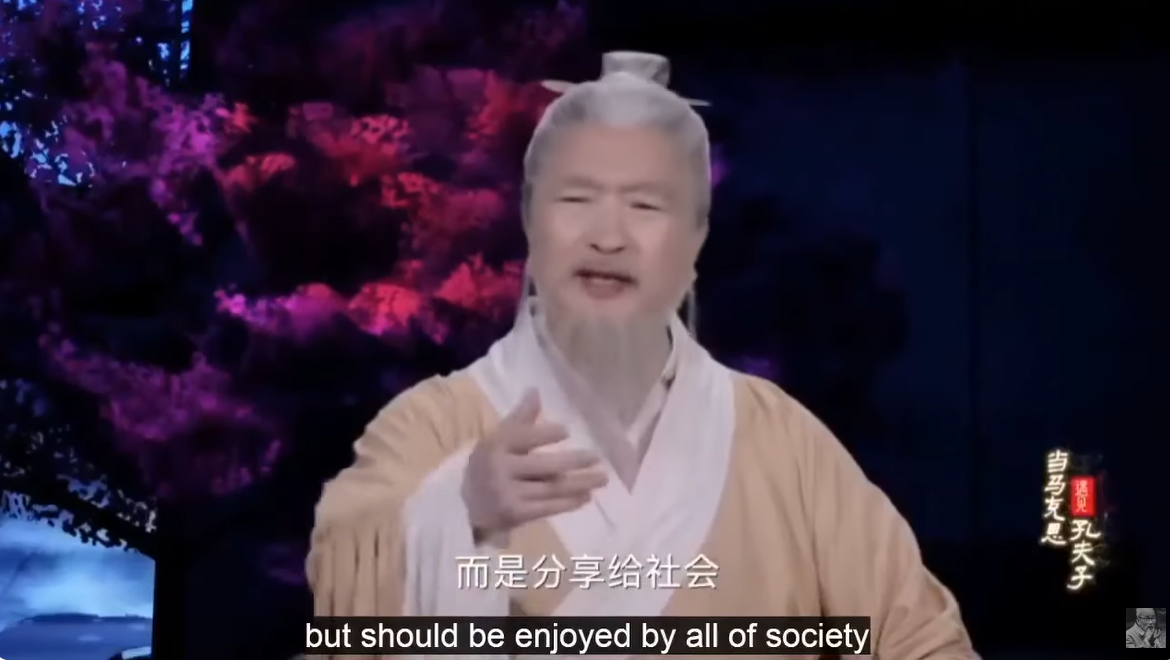


공자가 말하길, 이런 점들을 고려했을 때, 우리들의 관점은 서로 많이 비슷하다.
(일동) 박수
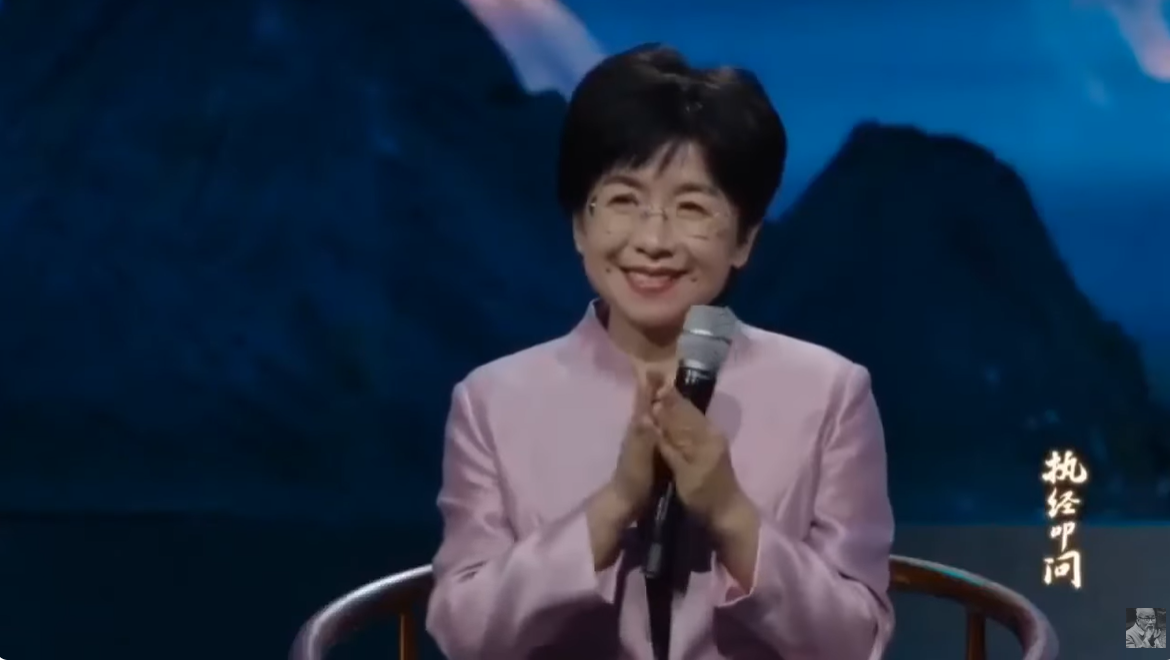
한 학생이 질문하다.
공자와 마르크스 두 사람 생각들이 어떻게 하나로 결합될 수 있는가?
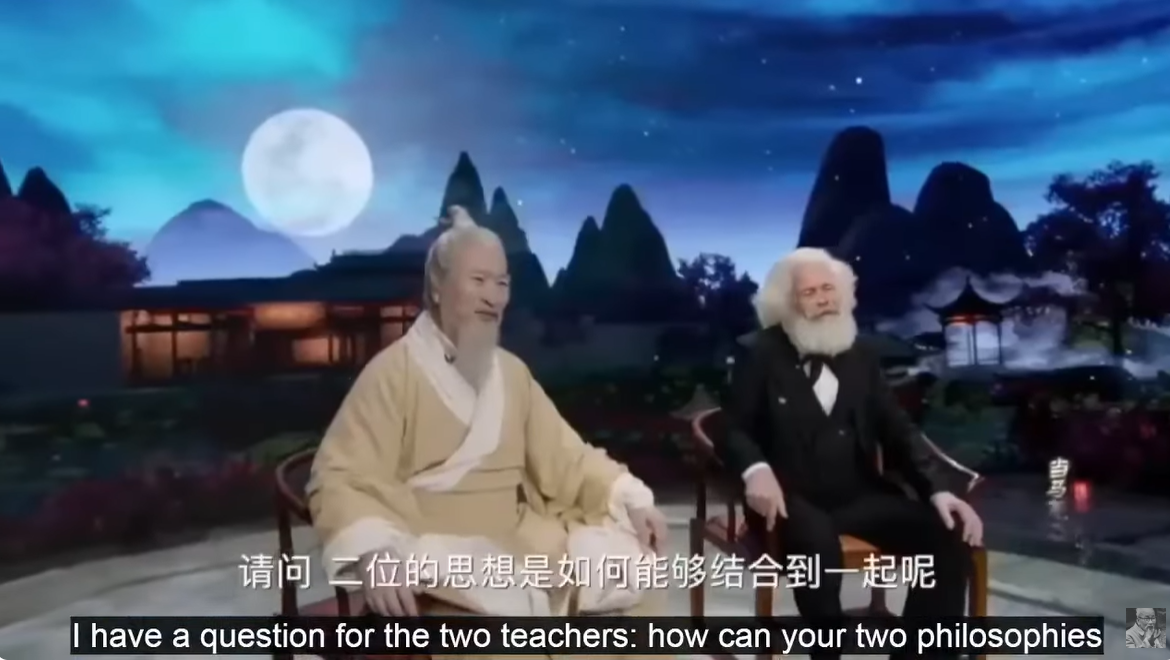
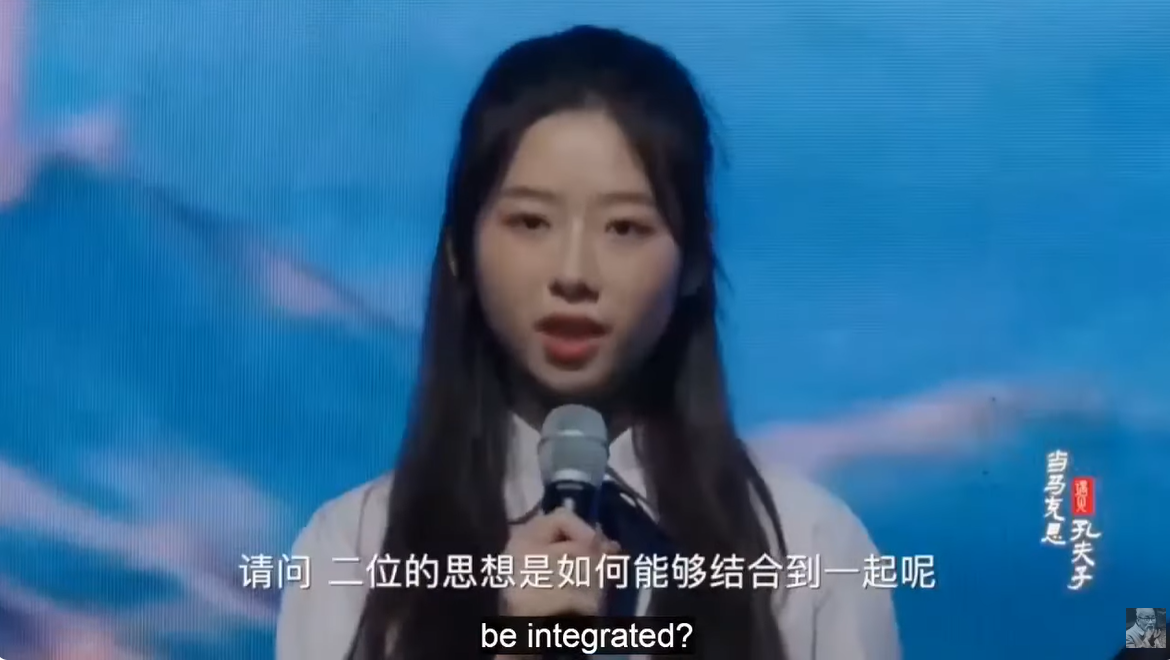
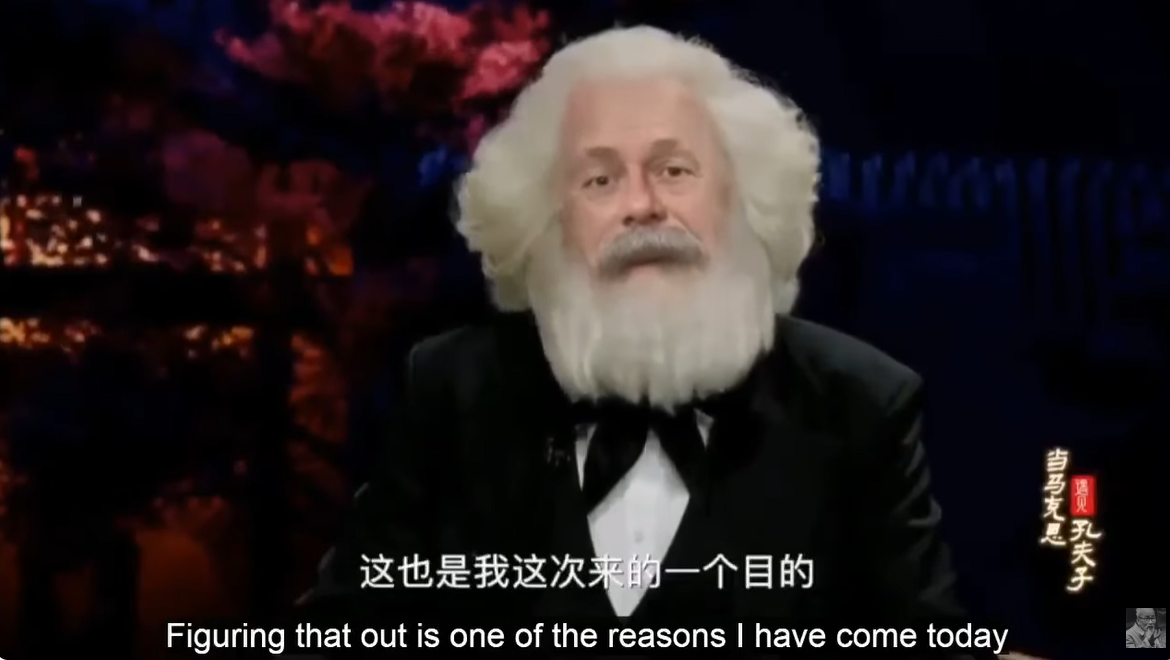
마르크스가 대답하길 "그 질문에 대답하는 게, 우리가 오늘 여기에 있는 이유들 중에 하나다"

공자가 말했다 "여기에 계신 두 교수들의 의견을 들어봐야 한다"


"공자와 마르크스의 제 2차 결합은 많은 필연성을 가지고 있다."



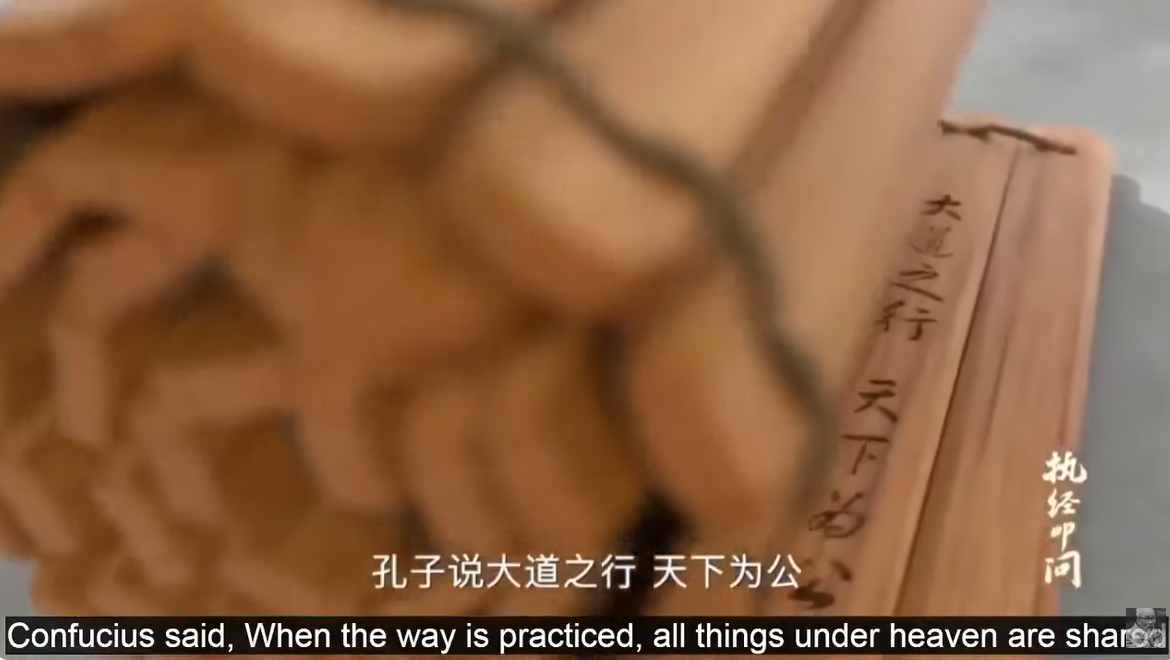

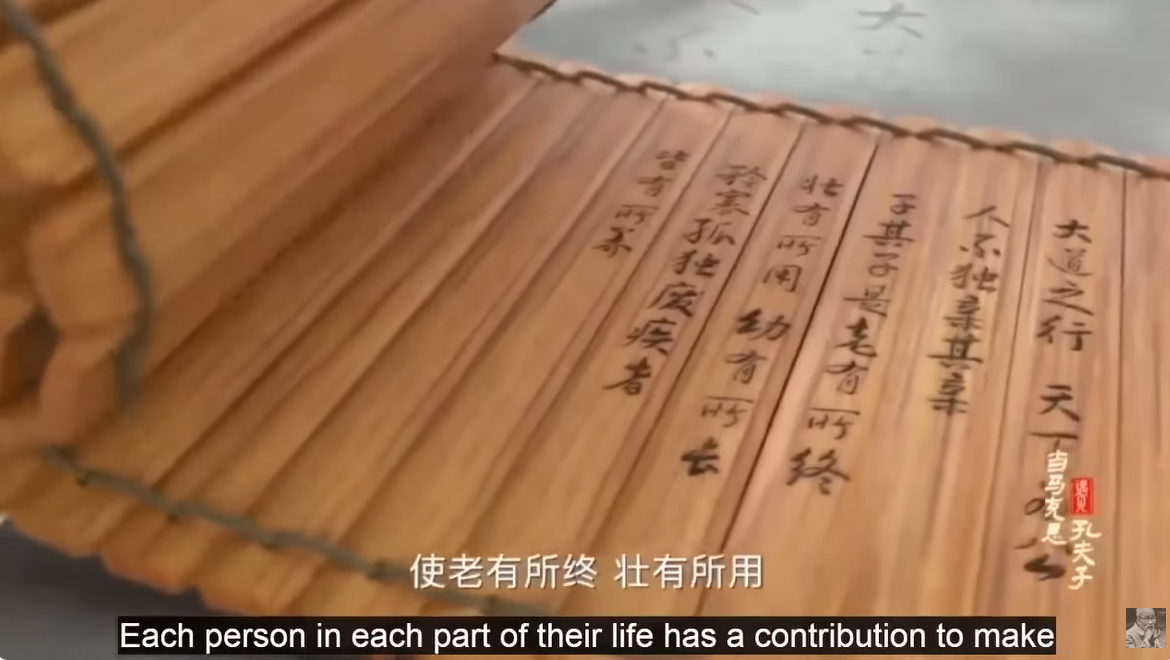
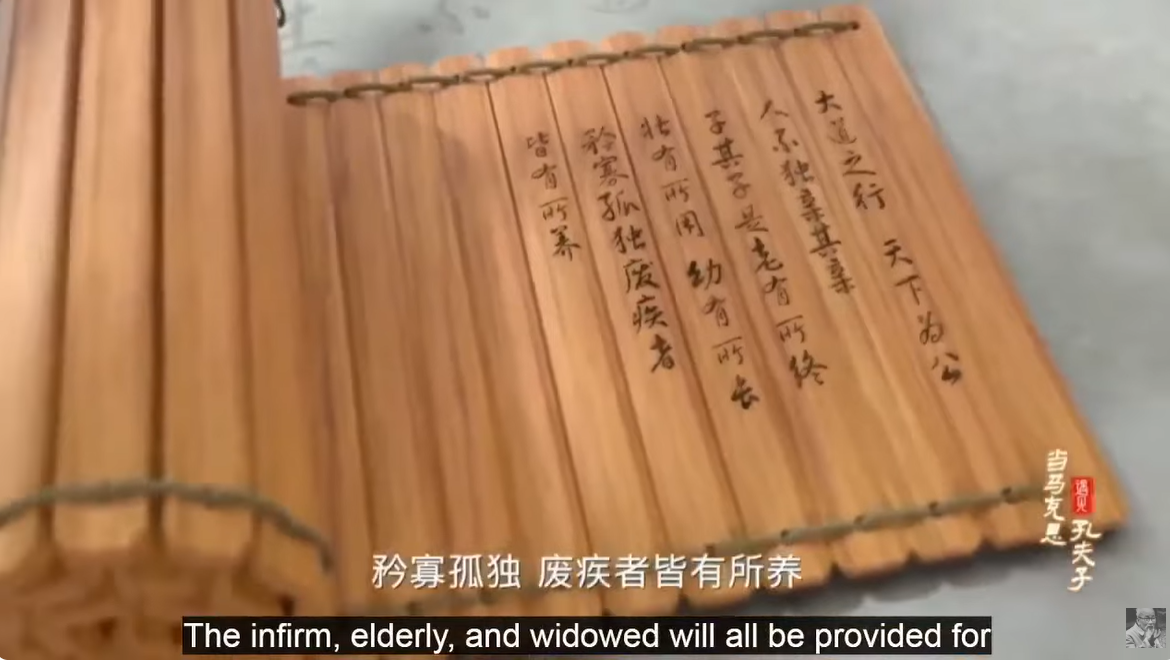

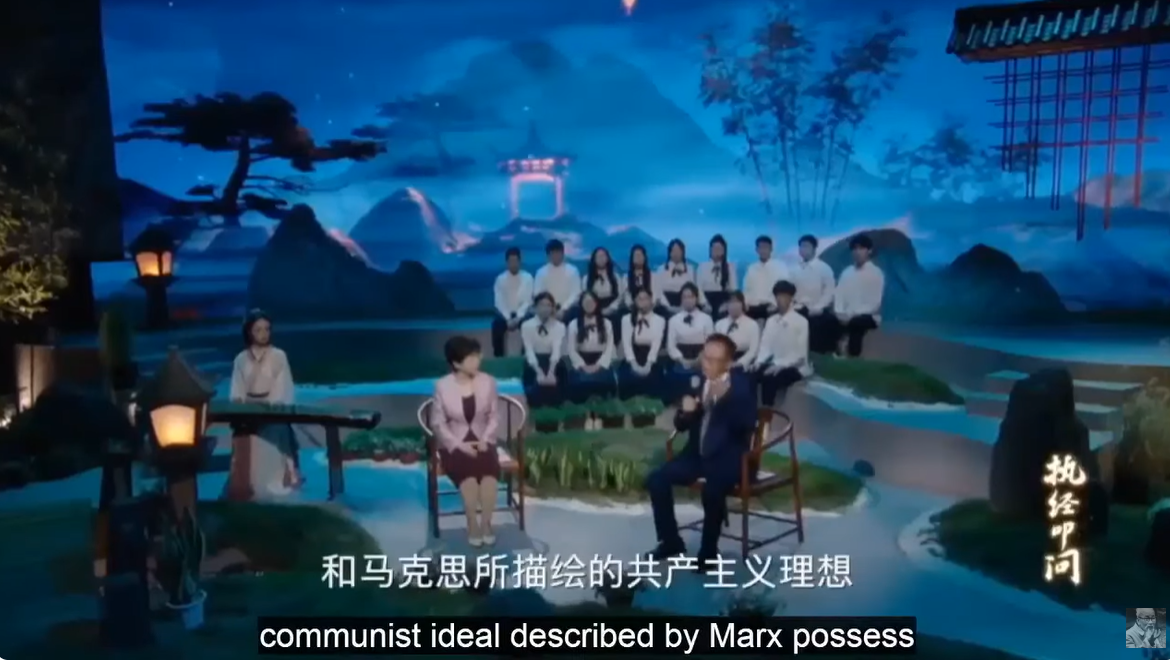
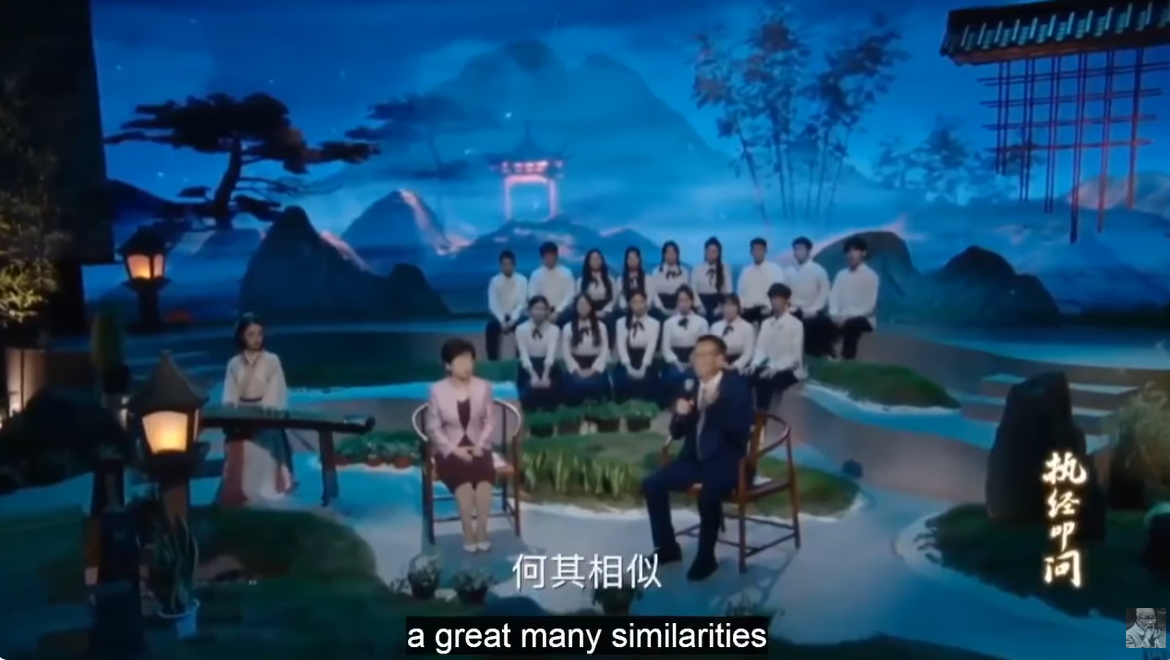
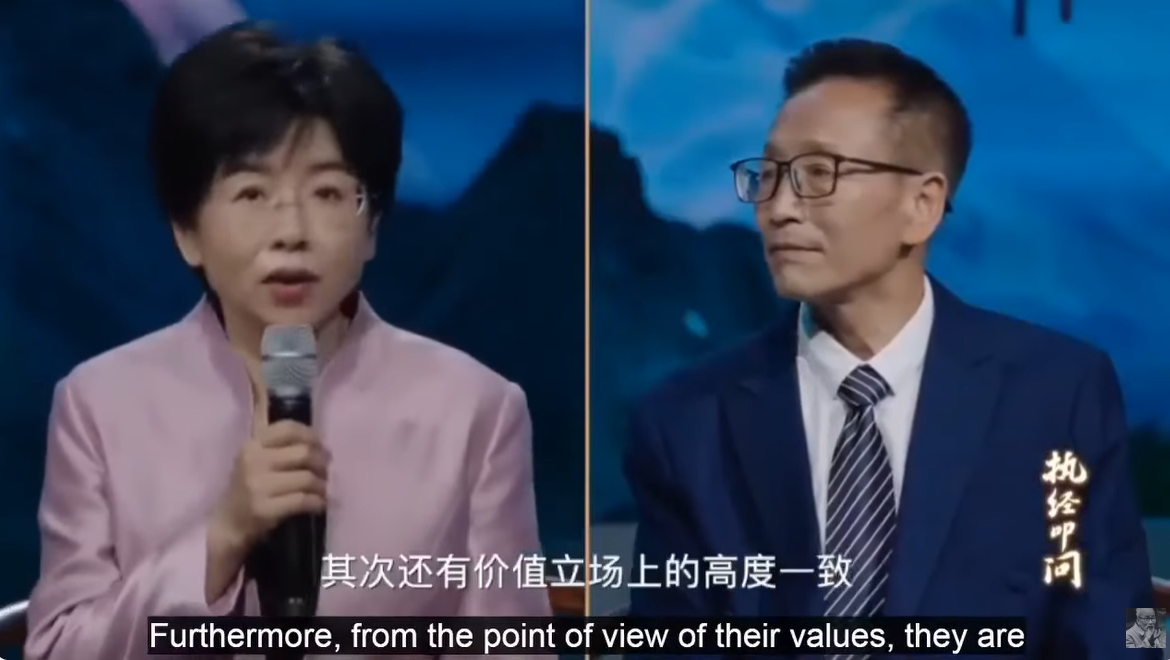
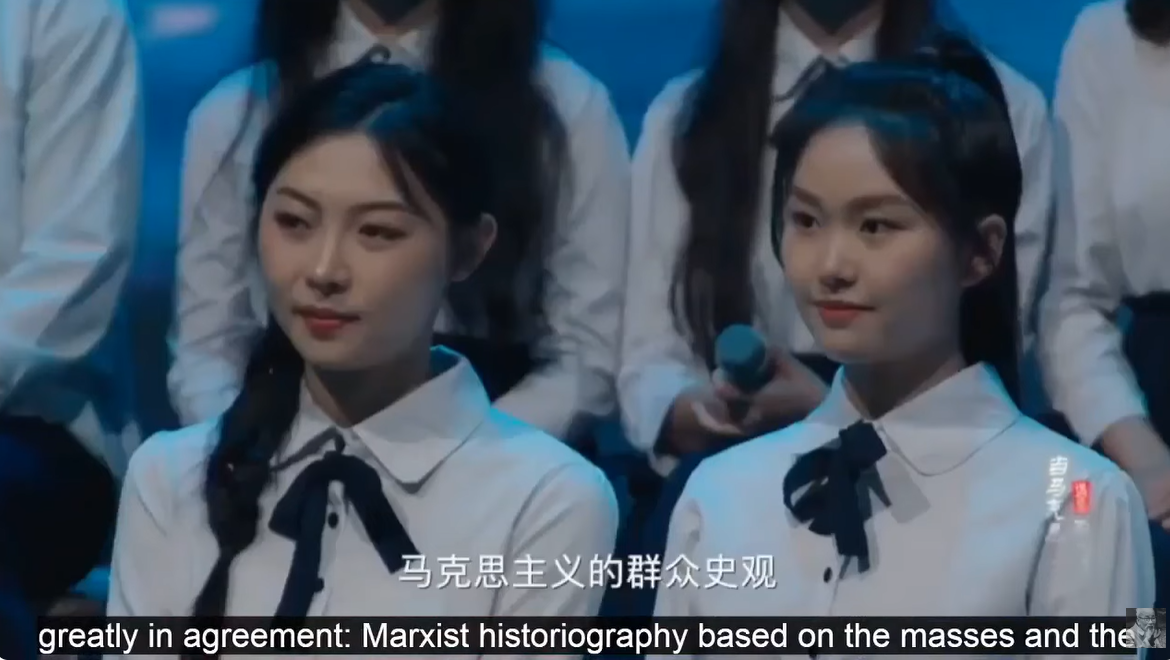






일동 박수.
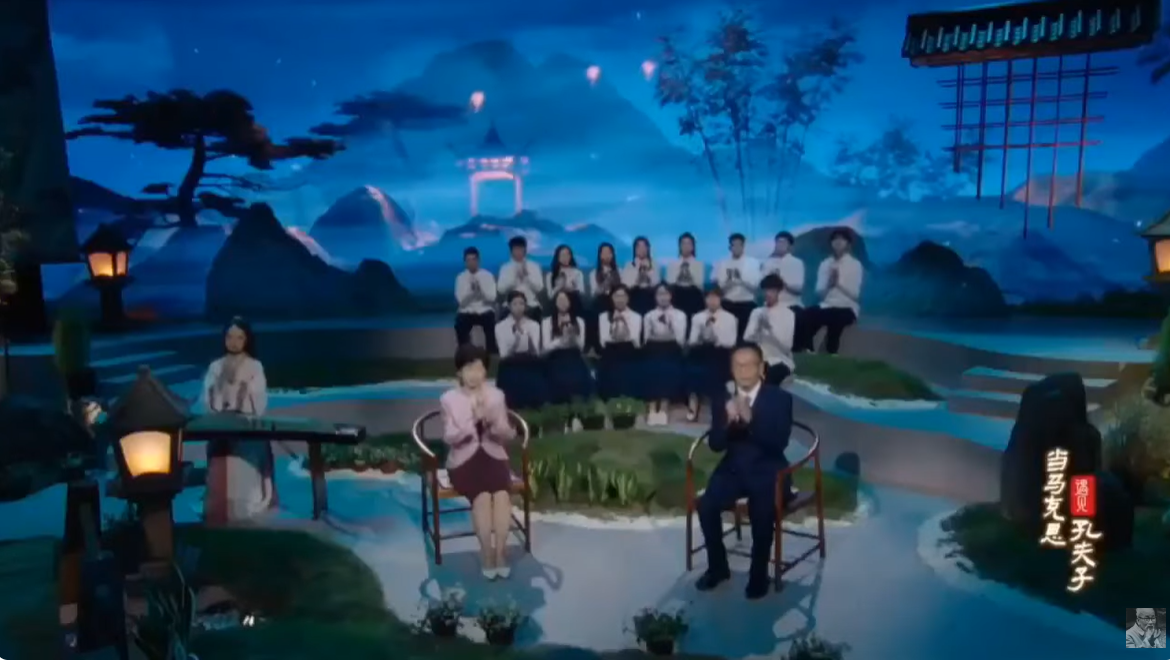


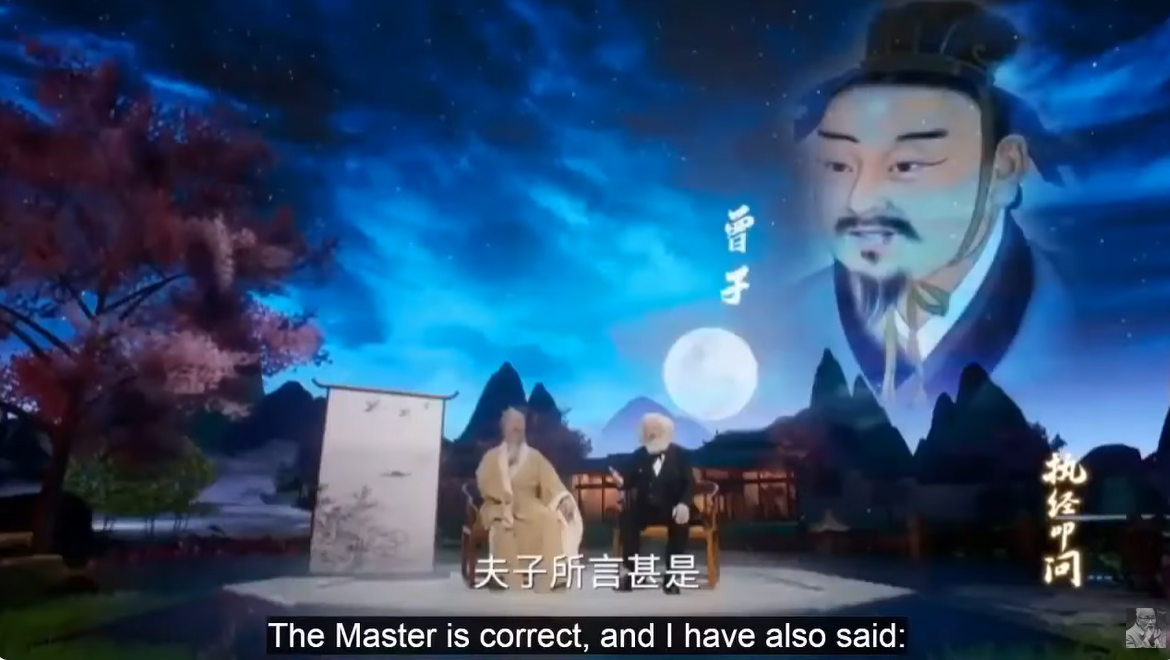
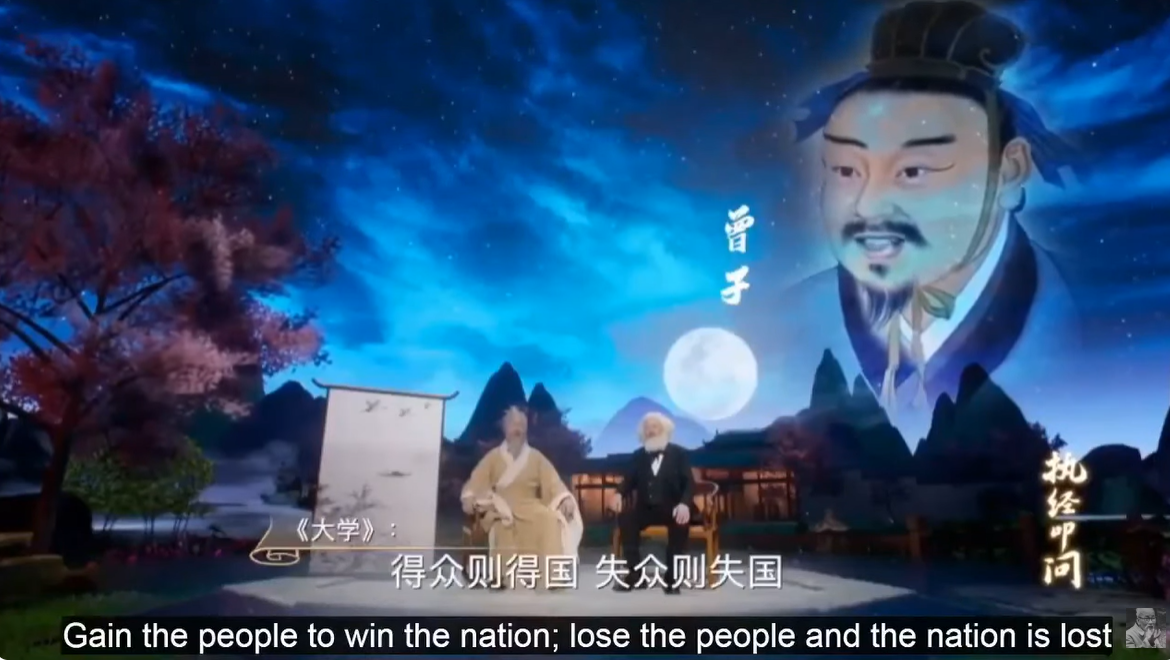

공자 "물이 배를 띄우기도 하지만, 물은 배를 뒤집어버리기도 한다"
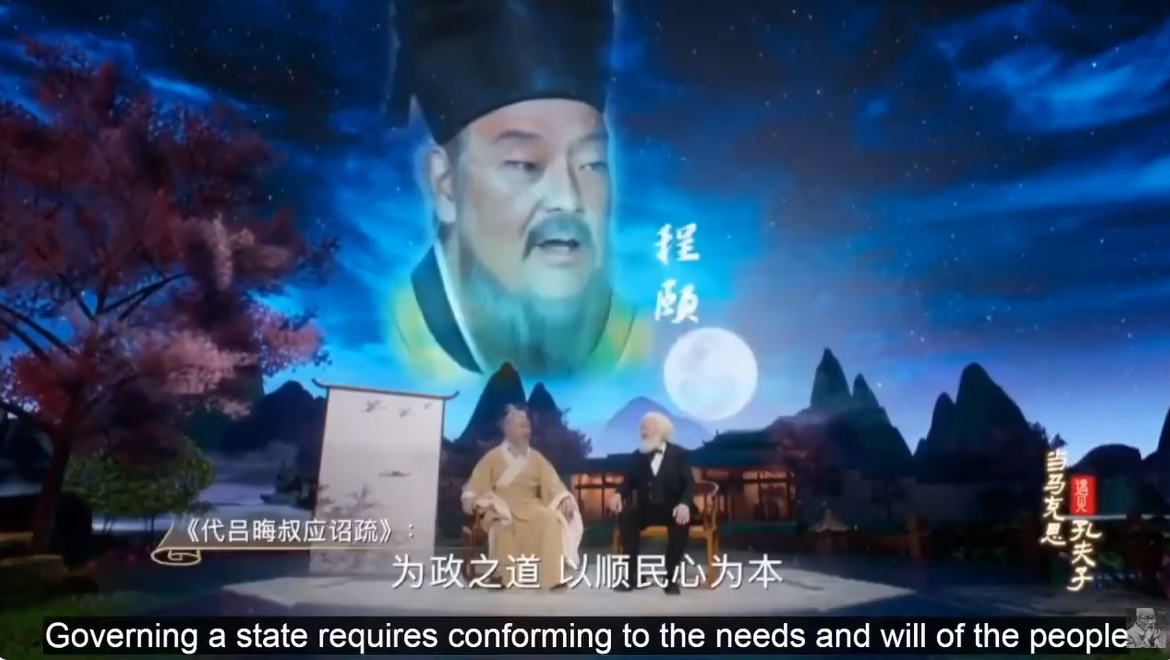

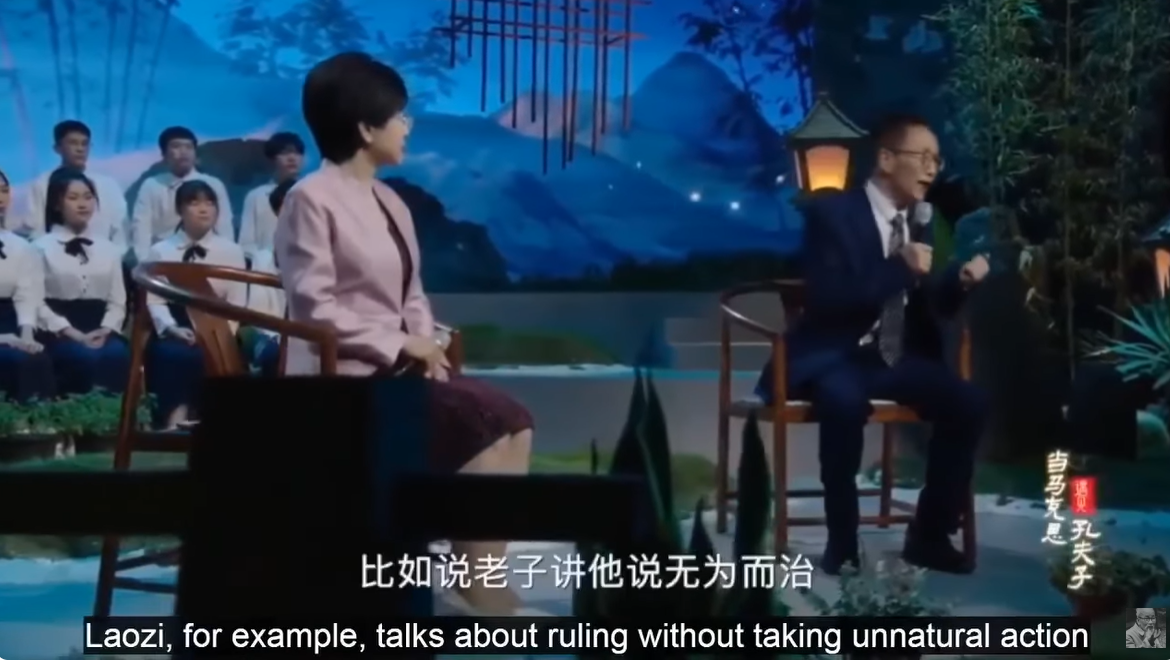
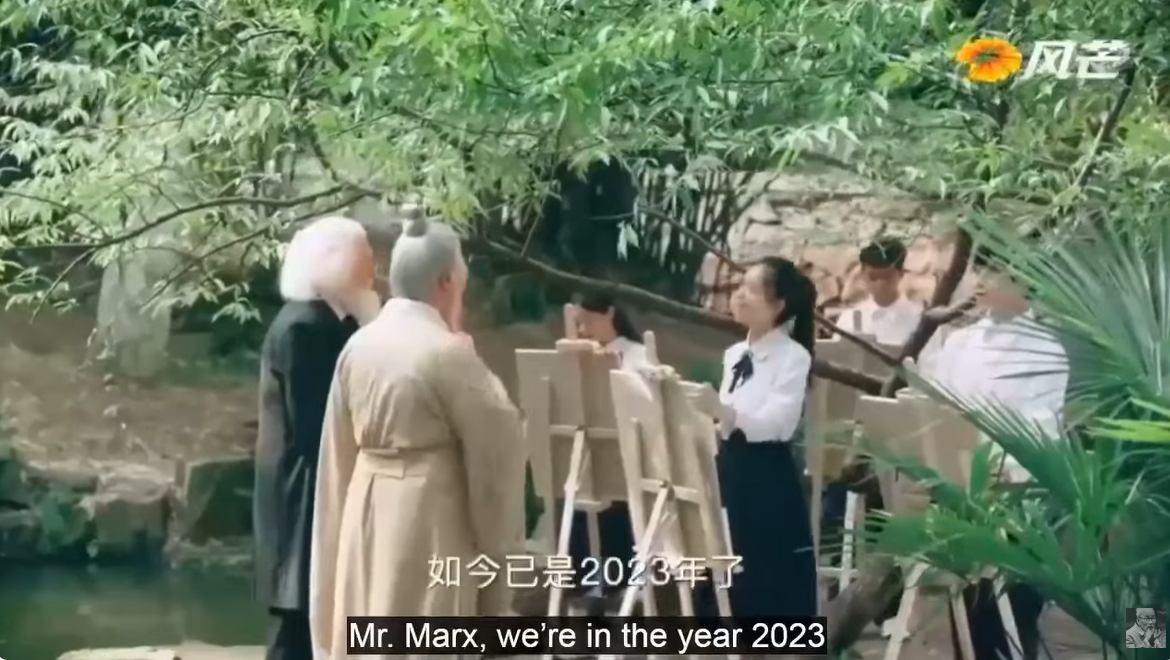
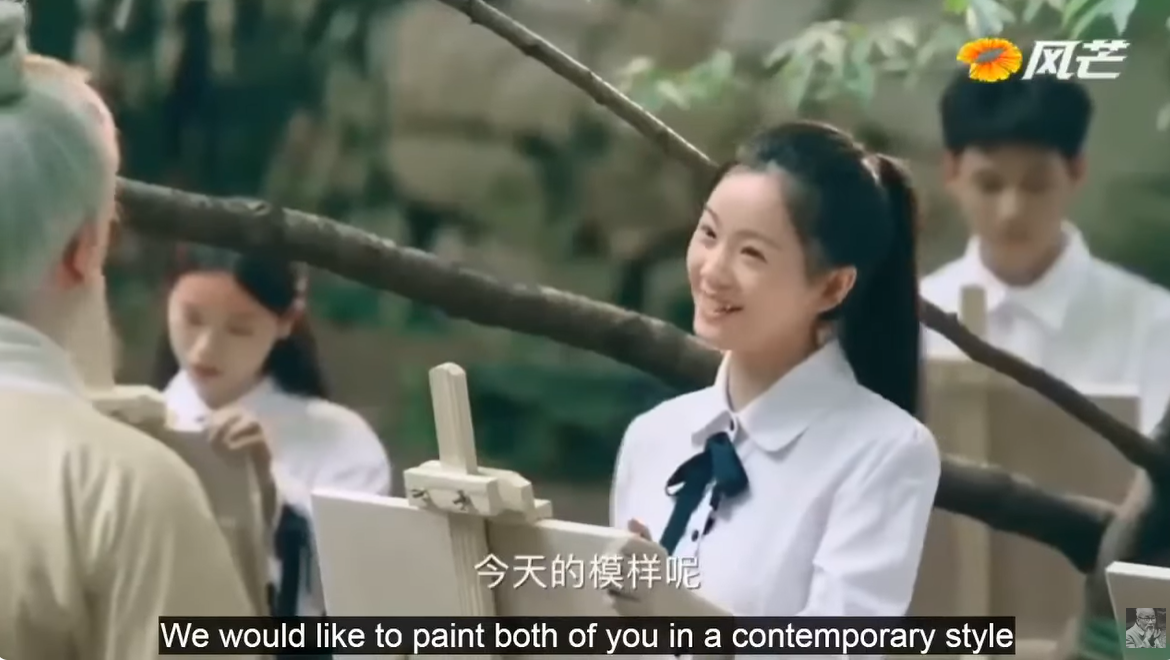


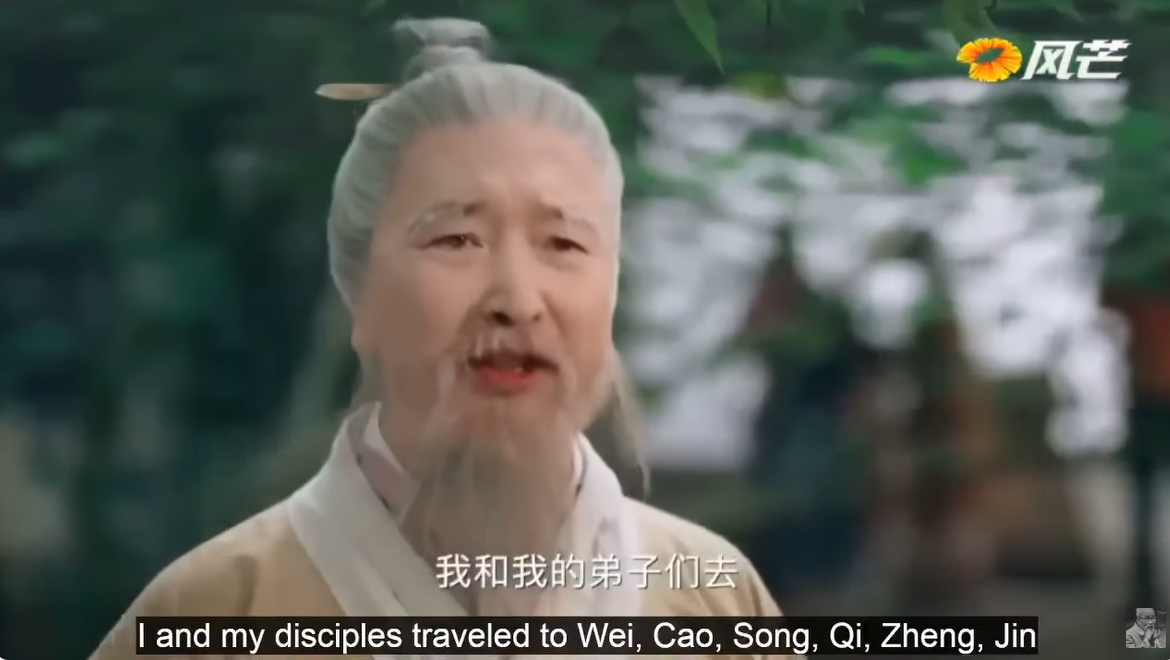

공자가 위 ( 魏 ), 조( 曹 ), 송 宋 , 제 齊(齐), 정 鄭(郑), 진 晉 (晋), 진 陳(陈), 채 ( 蔡 )나라 등 수 많은 나라들을 방문하는데, 14년이 걸렸다.
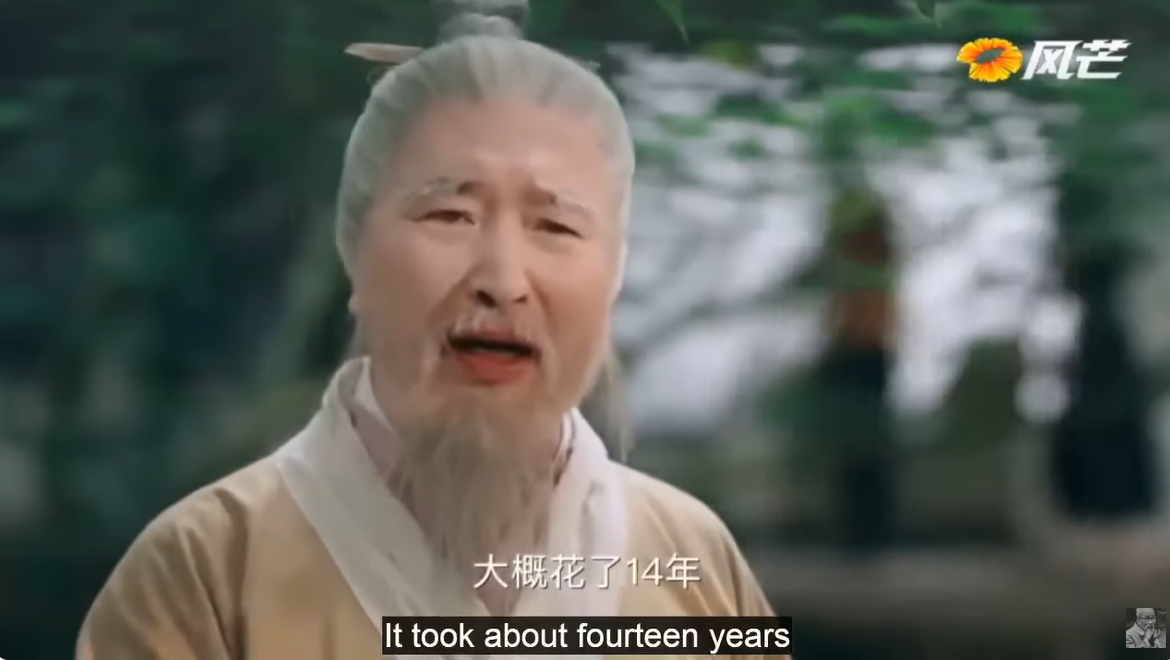
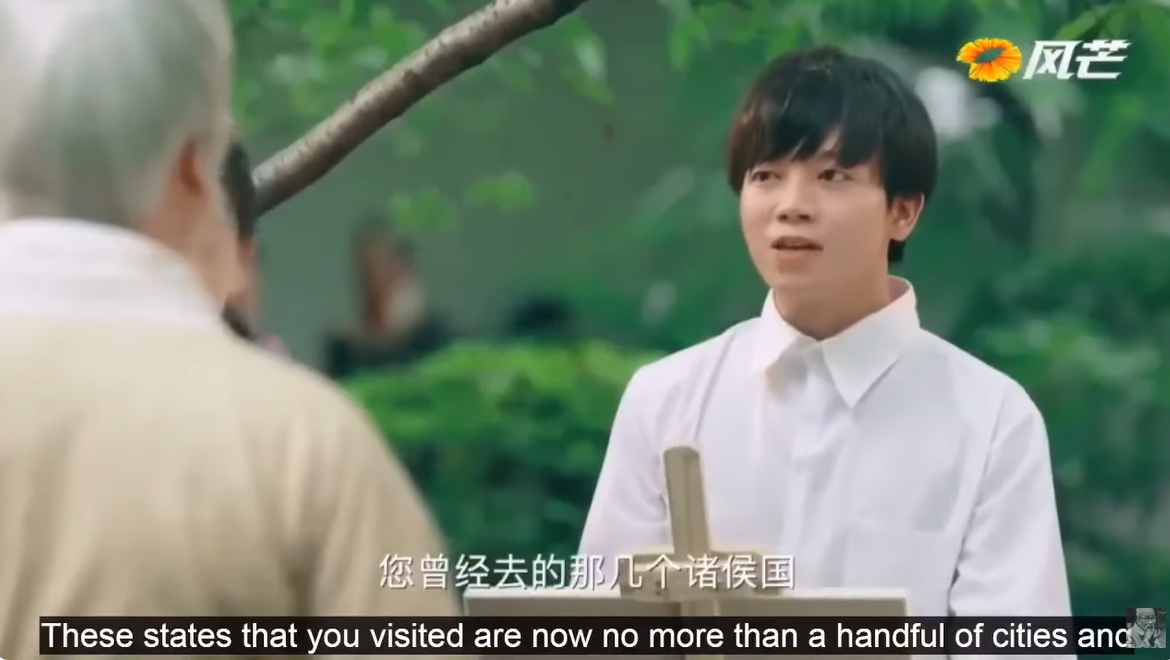


공자님이 당시 노나라에서 위나라를 거쳐 조나라에 도착했는데, 이제 루난 (노남) 고속 철도를 이용하시면, 58분 밖에 걸리지 않습니다.

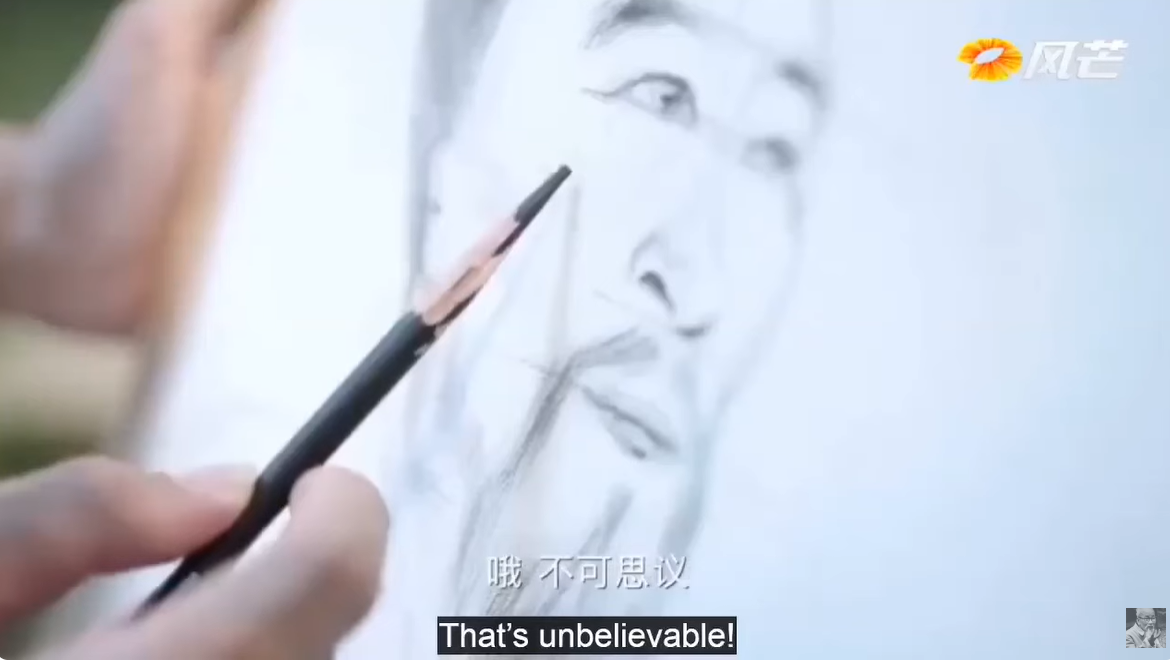


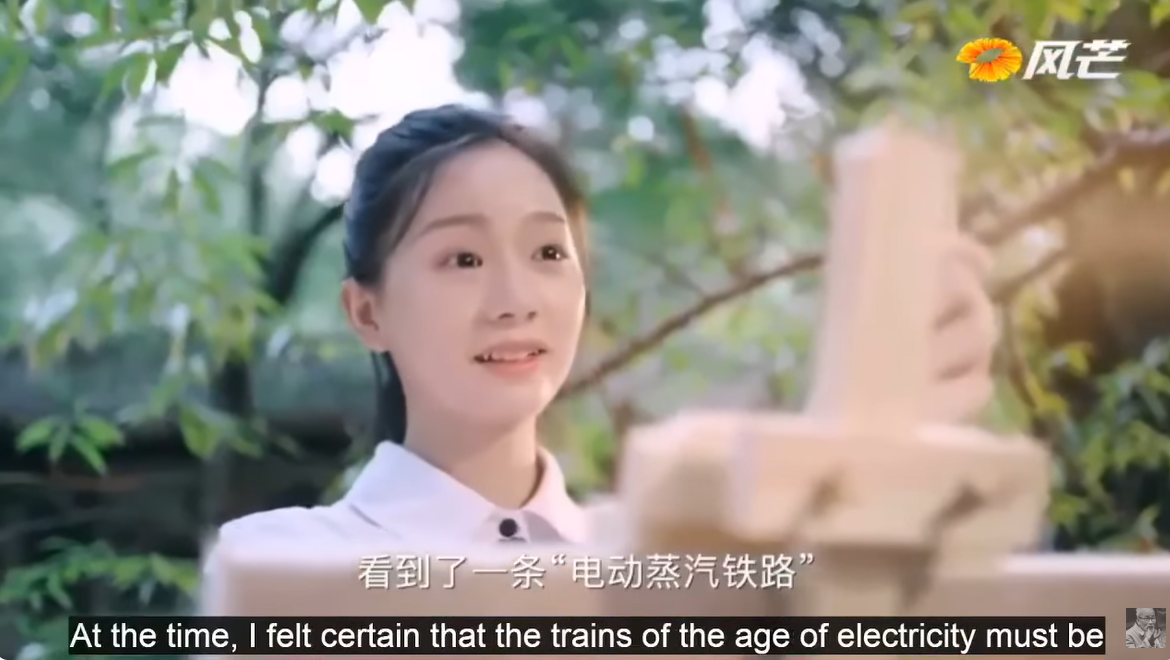
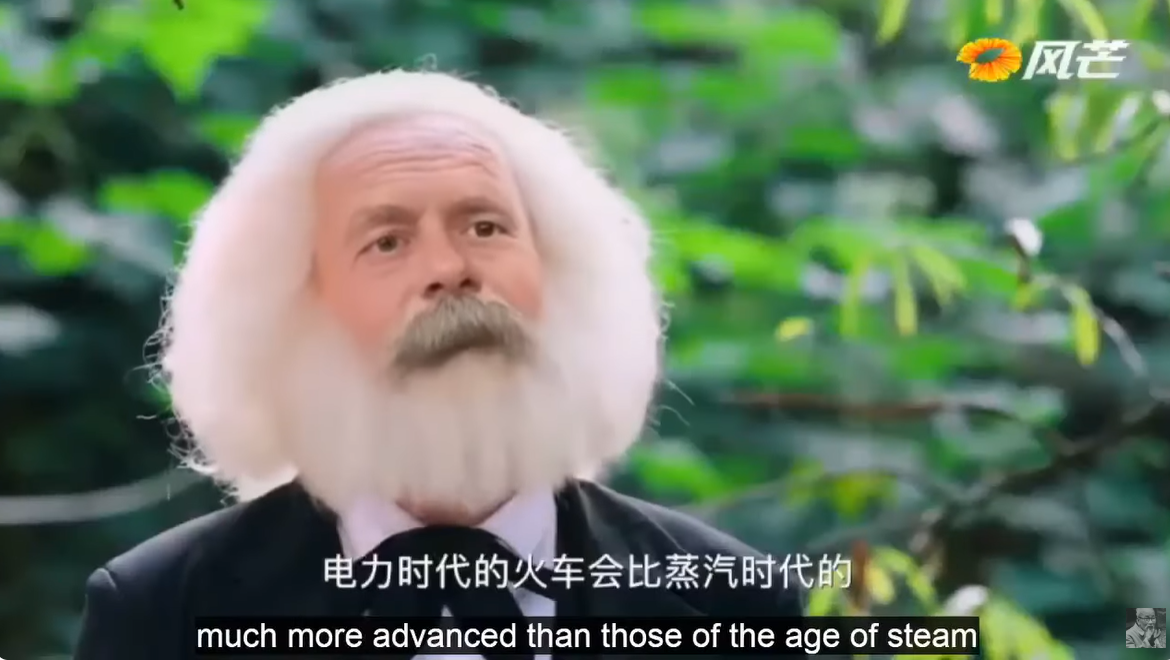

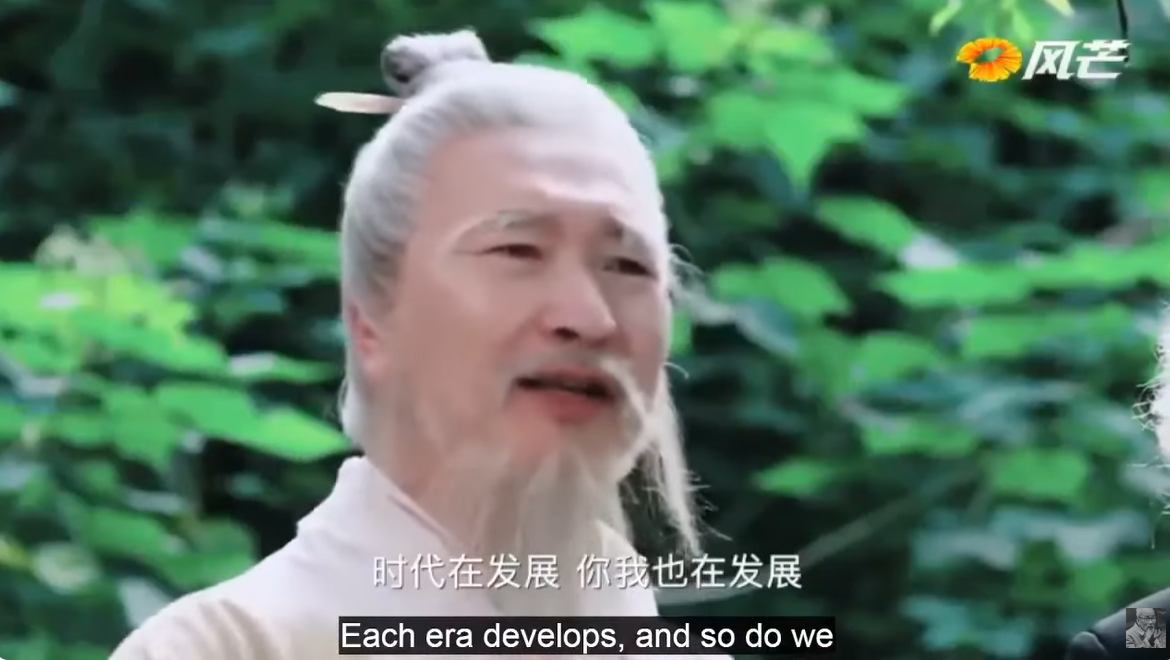





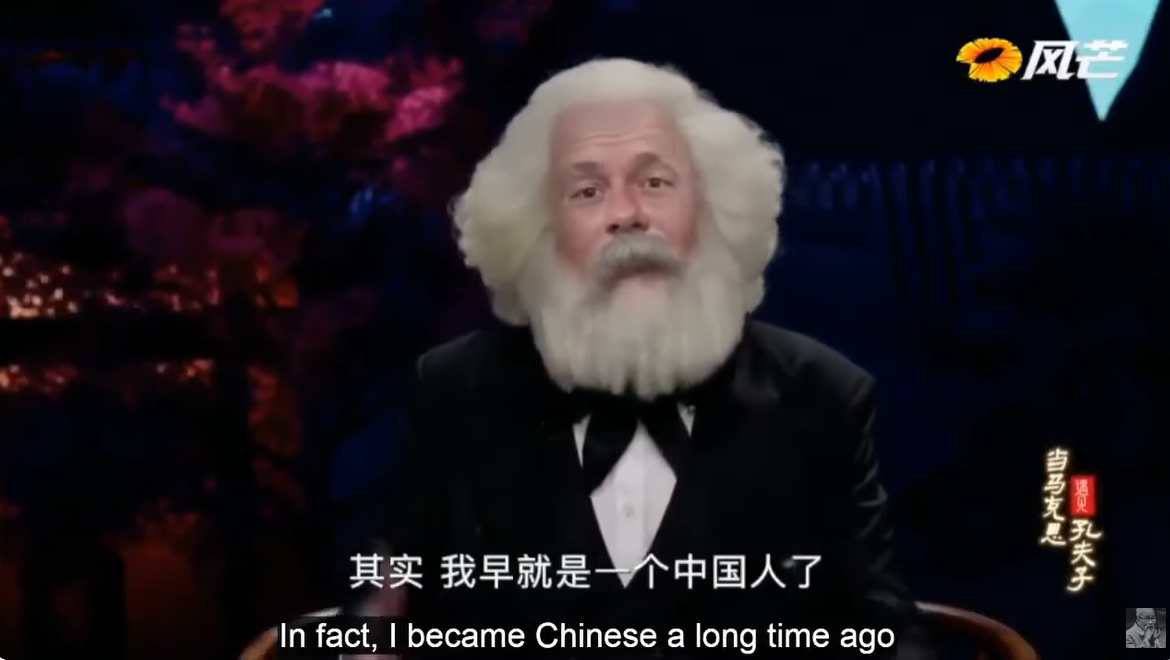
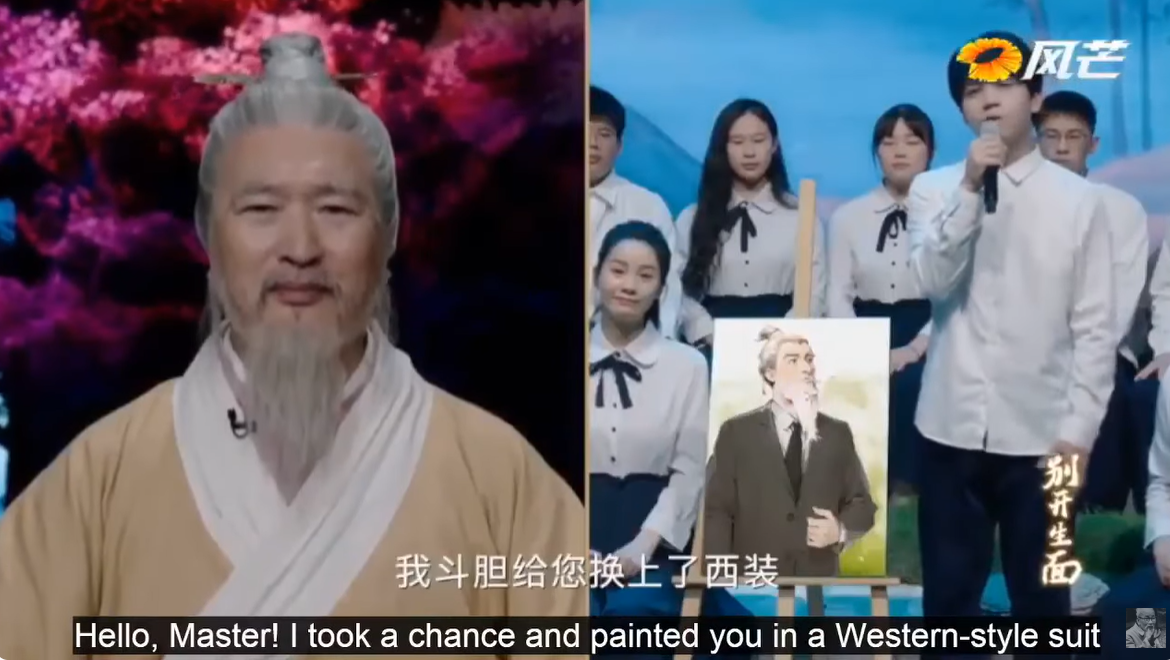
참고 동영상.
유투브 当马克思遇见孔夫子 When Marx Met Confucius
https://youtu.be/Erk_xSGXWJg?si=dCgD387i2VW1Fjv8
'정책비교 > 국제정치' 카테고리의 다른 글
| 팔레스타인-이스라엘 전쟁. 하마스 정전 협정 과정 (0) | 2024.02.07 |
|---|---|
| 팔레스타인-이스라엘 전쟁. bbc 보도. 가자 인구 80%, 170만 집 떠난 상태. 가자 지구의 50~61% 건물 폭파당하거나 훼손 당함. (0) | 2024.02.01 |
| 독일, 반나치 시위. 반 AfD 시위. (0) | 2024.01.20 |
| 중국 인도 교역량 증가 (1) | 2023.12.18 |
| 팔레스타인 희생자. 서안 지구와 동예루살렘. Since the start of 2023, at least 483 Palestinians have been killed and more than 12,769 injured by Israeli forces and settlers in the occupied West Bank. (0) | 2023.12.12 |
| 짜장면 가격 상승 원인. 2022년 4월 (1) | 2023.12.01 |
| commonwealth 커먼웰쓰 뜻. 나라.국가 (공동선 실현을 목표로 함.법에 기초함) (1) | 2023.11.24 |



